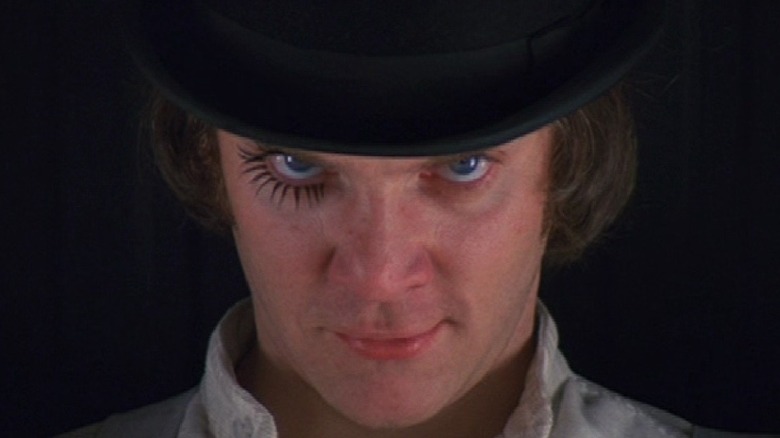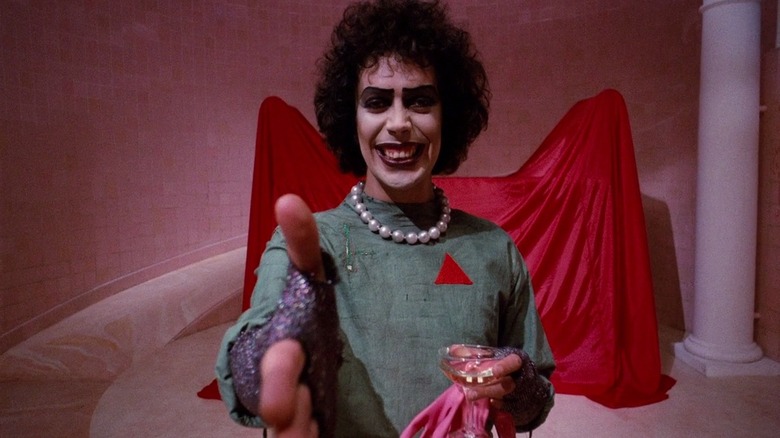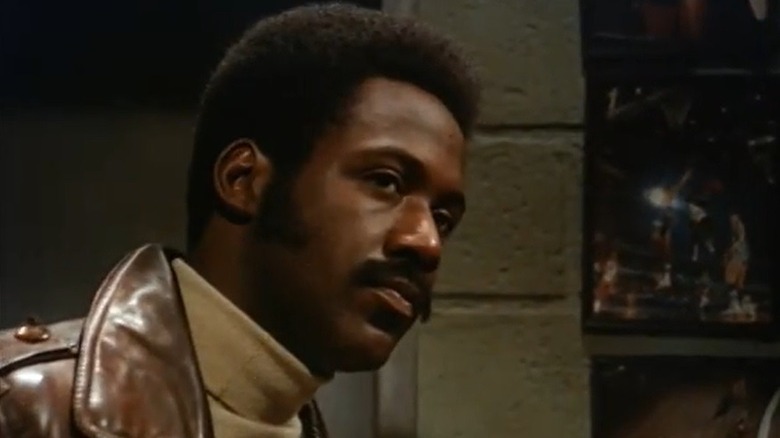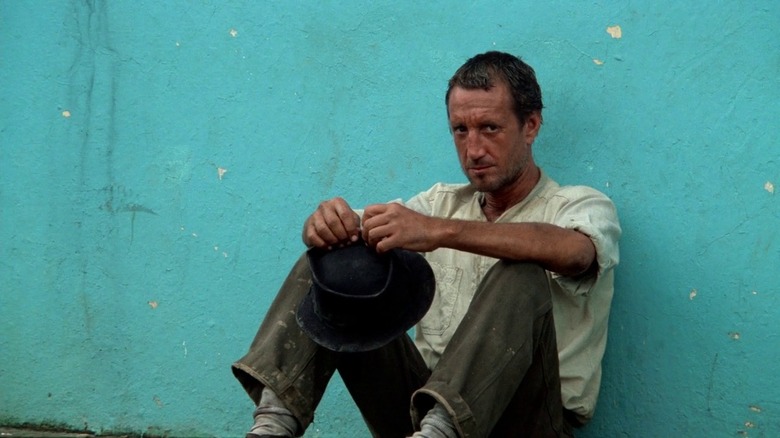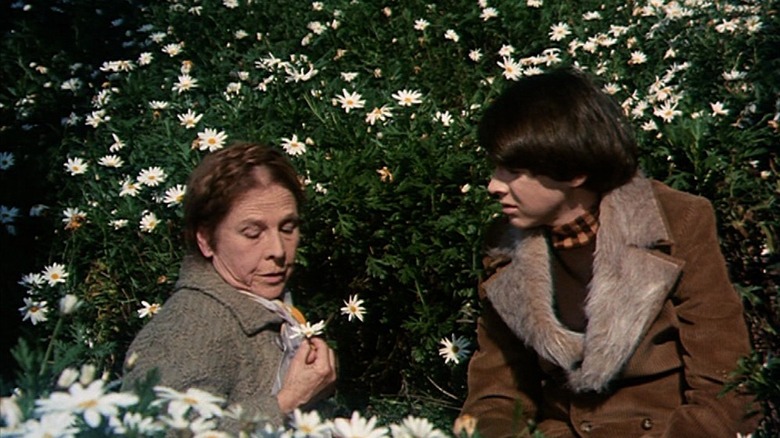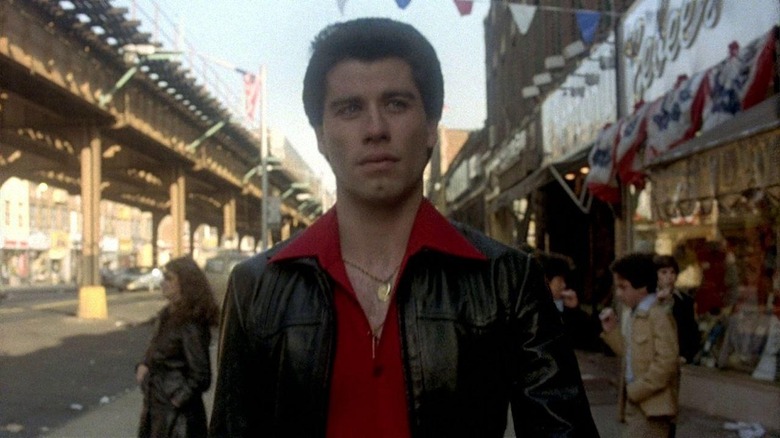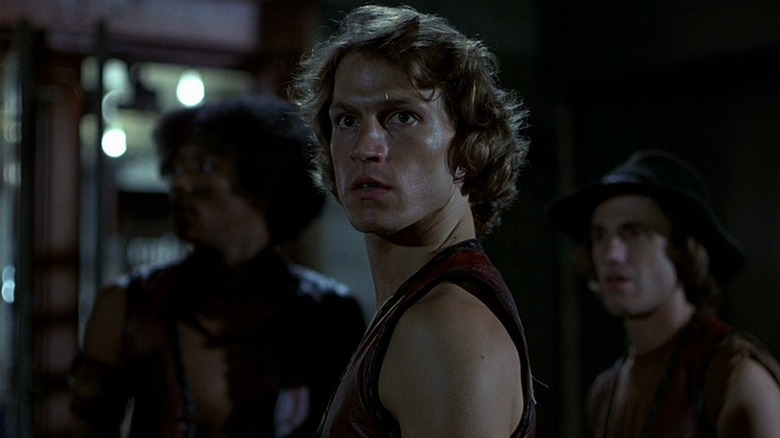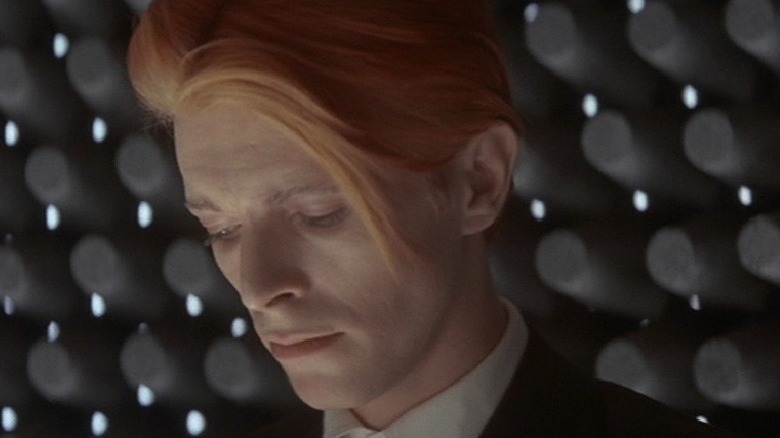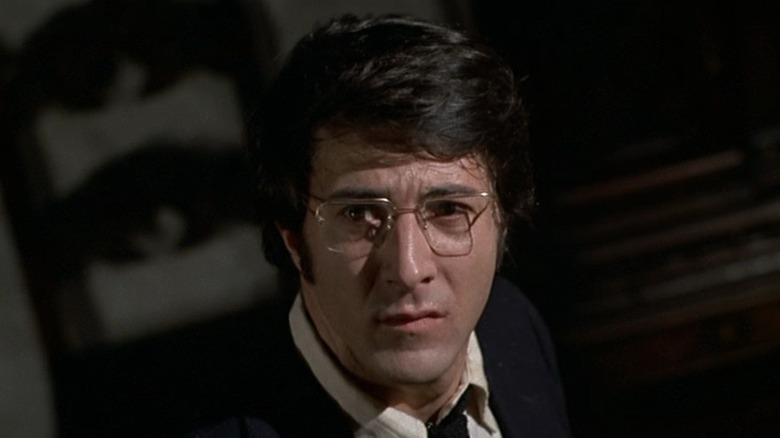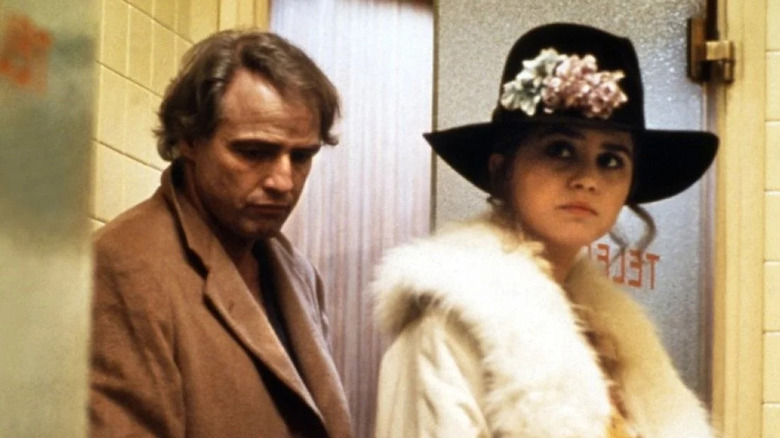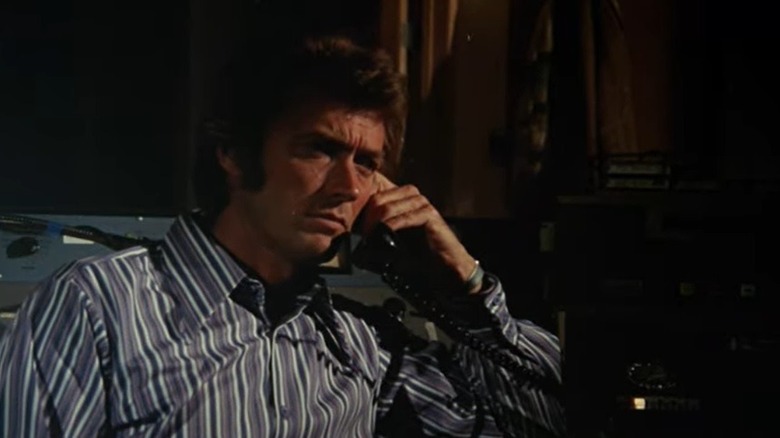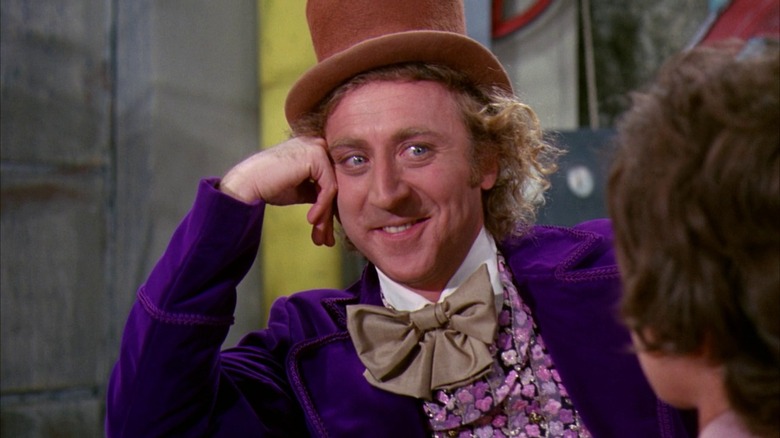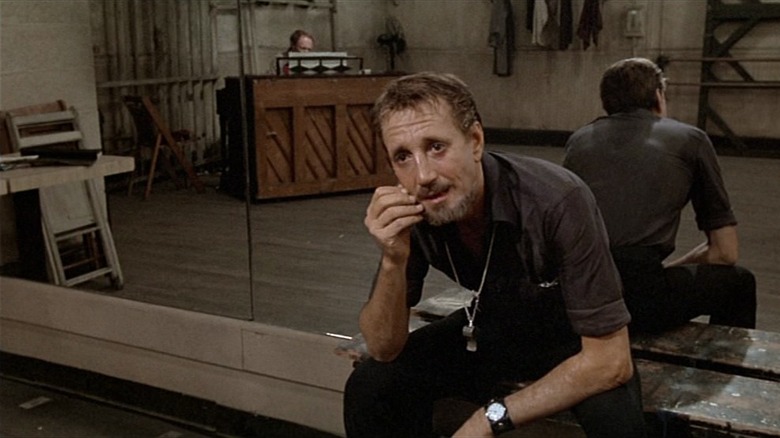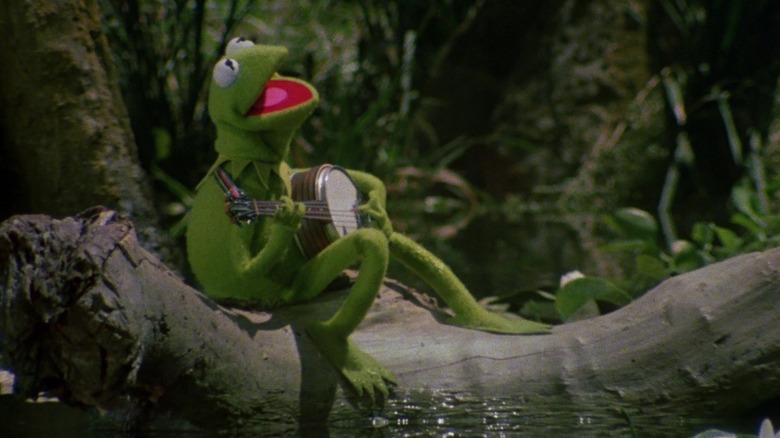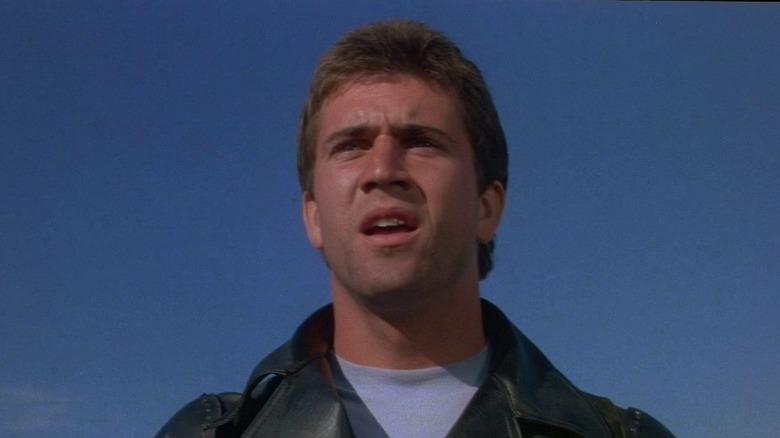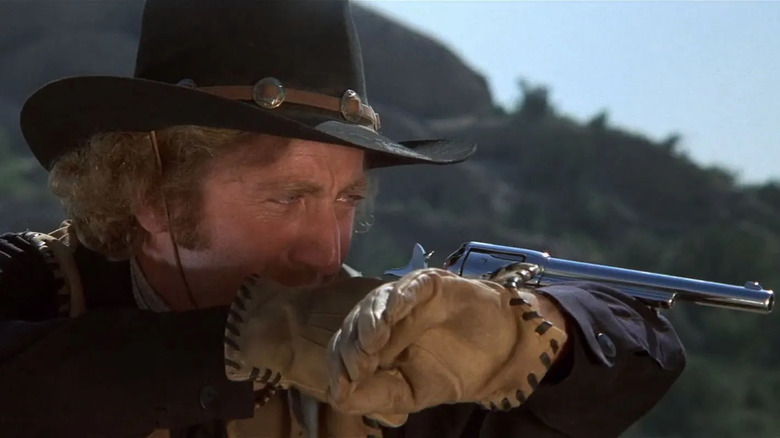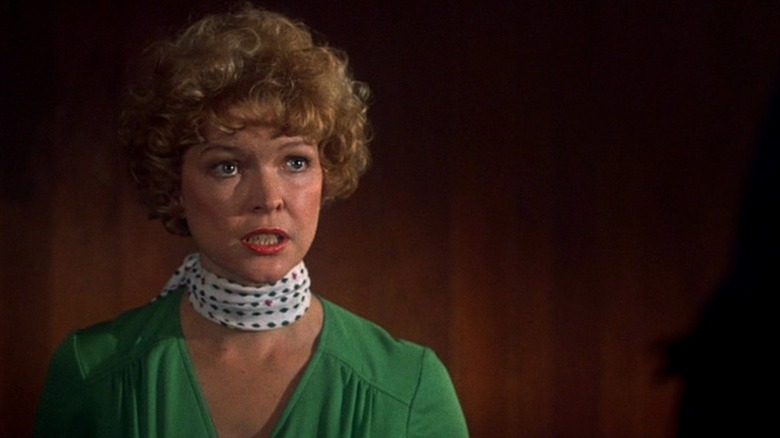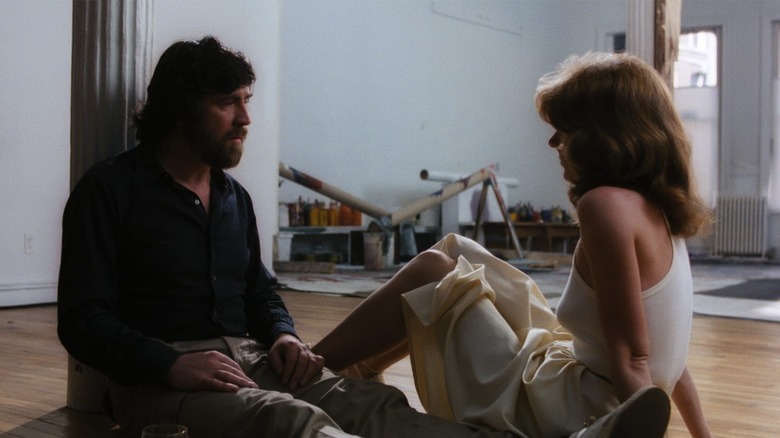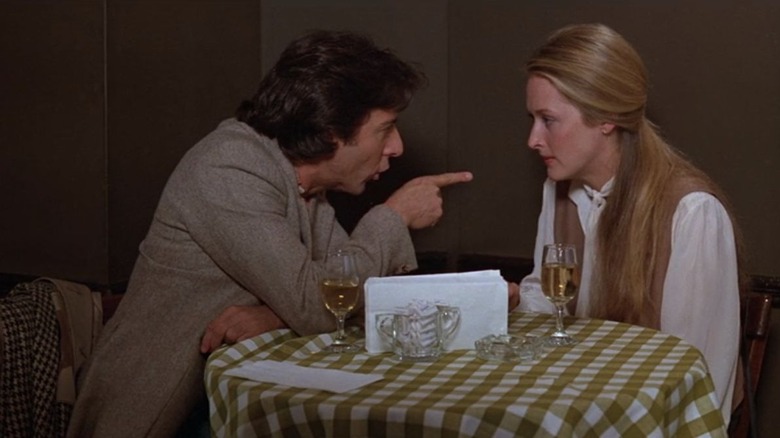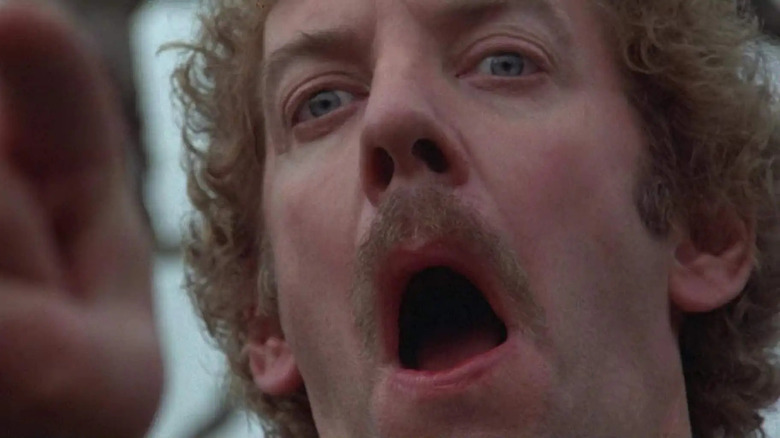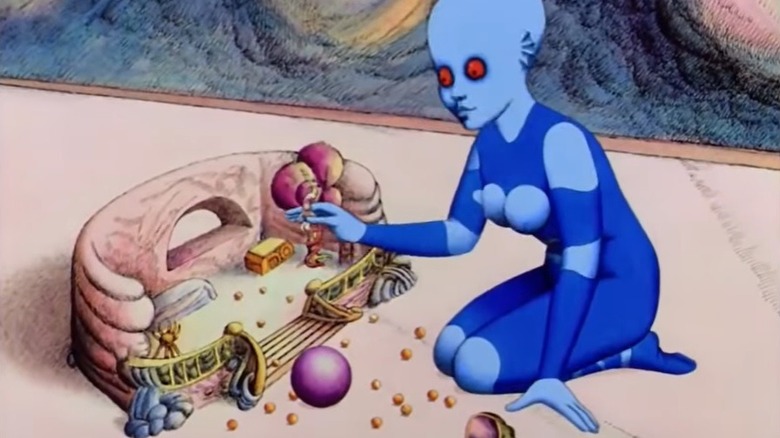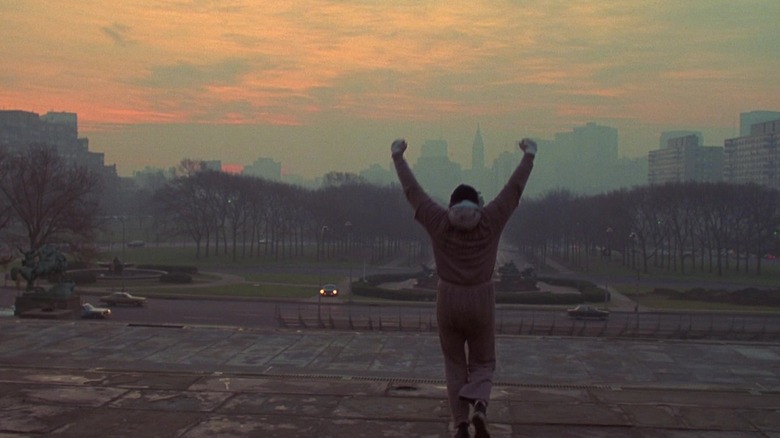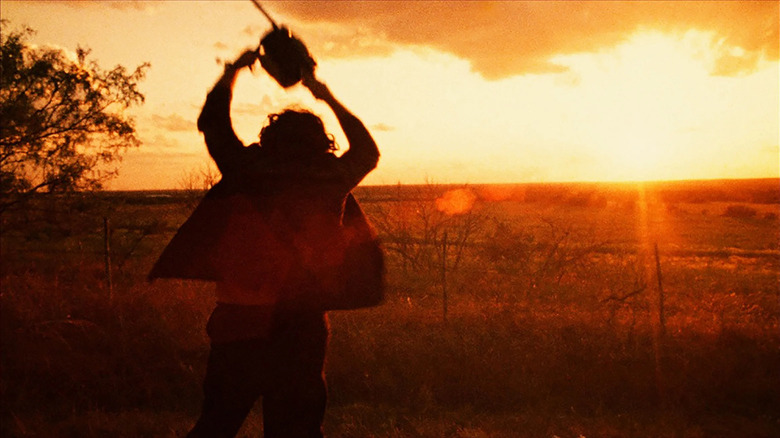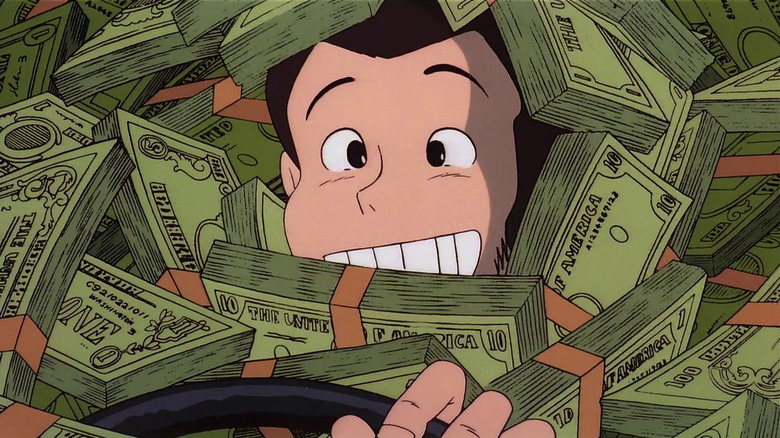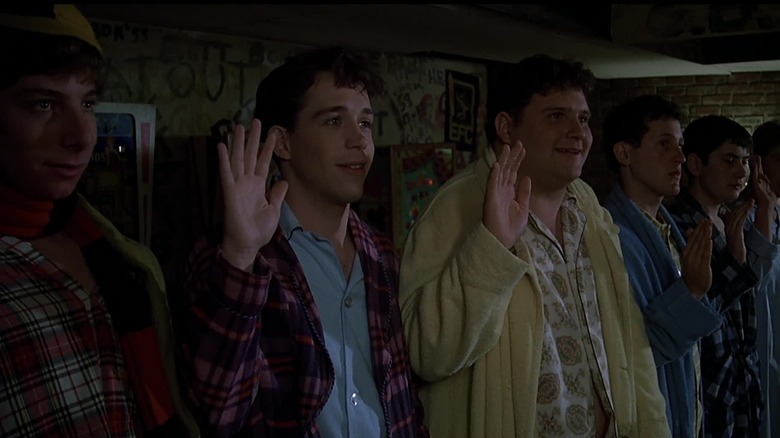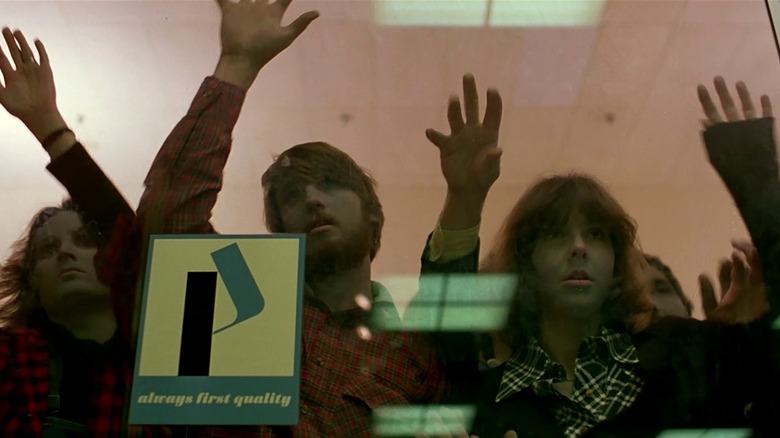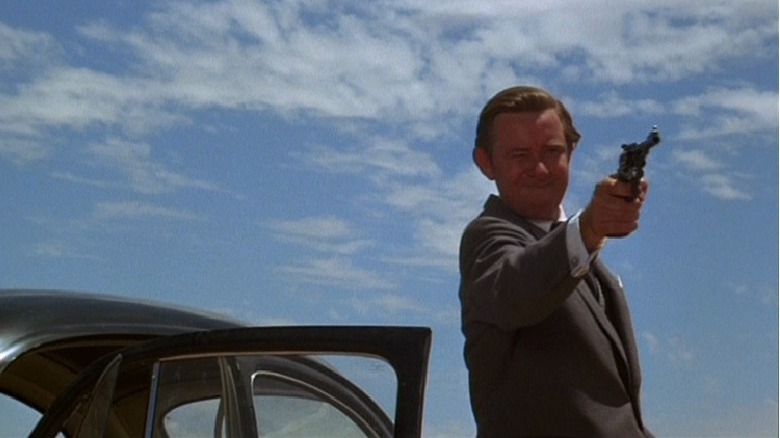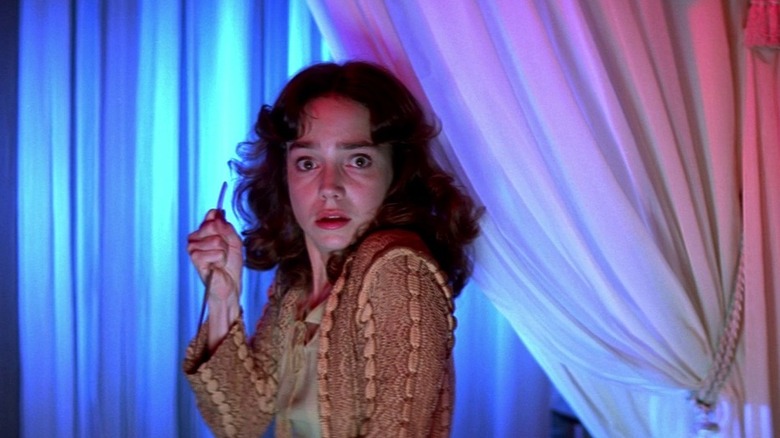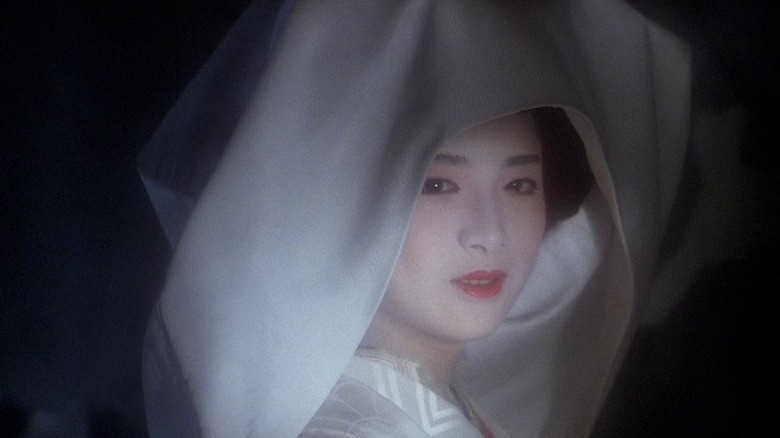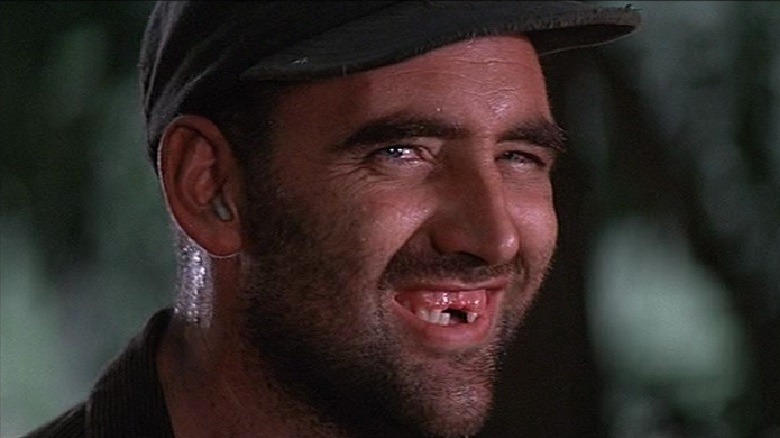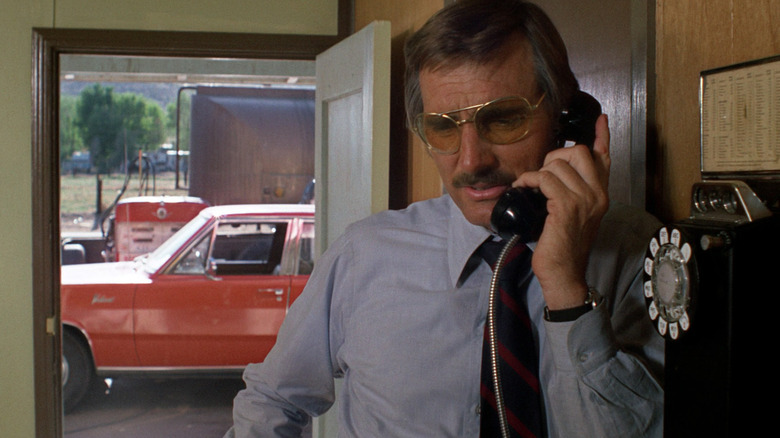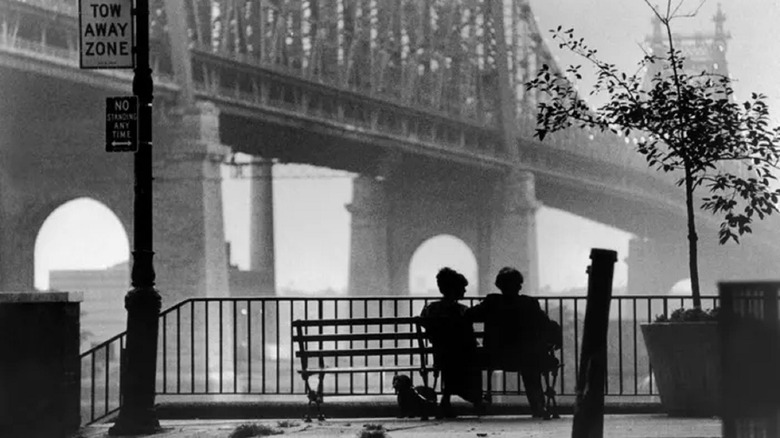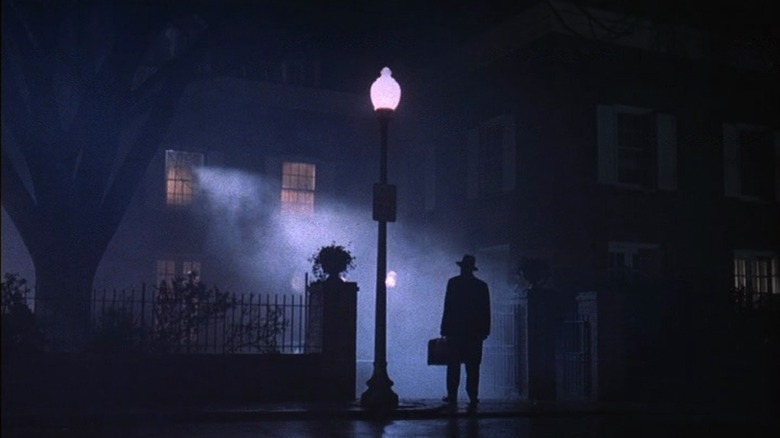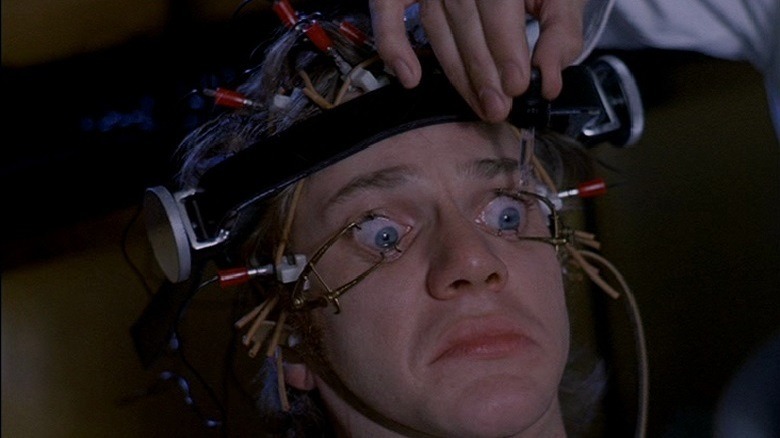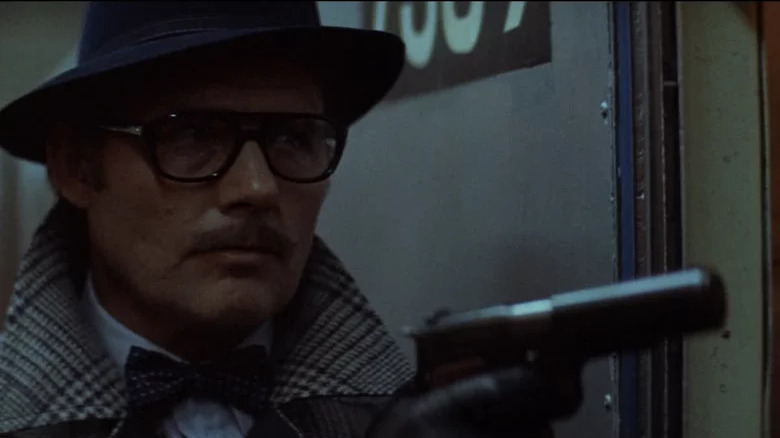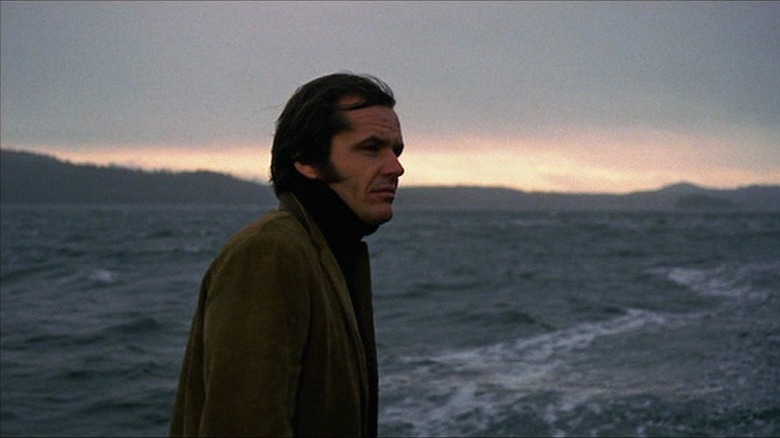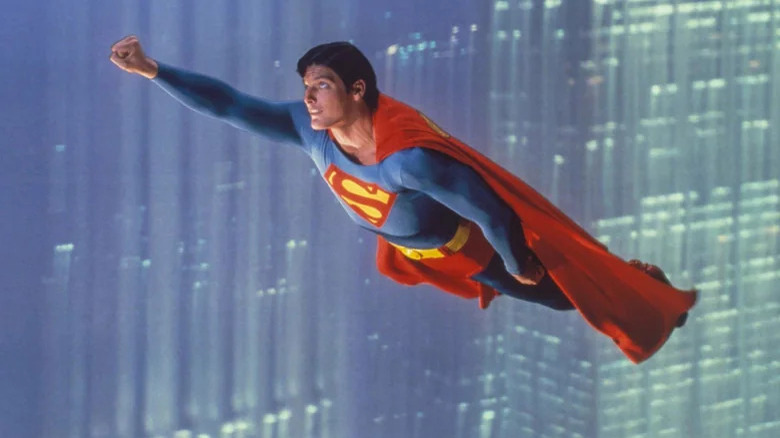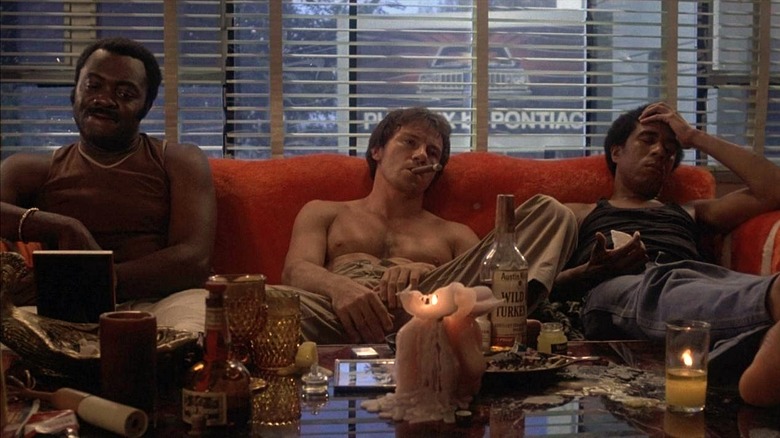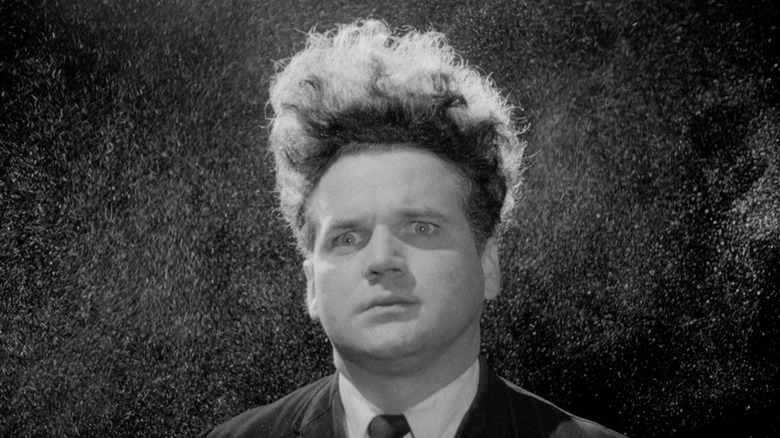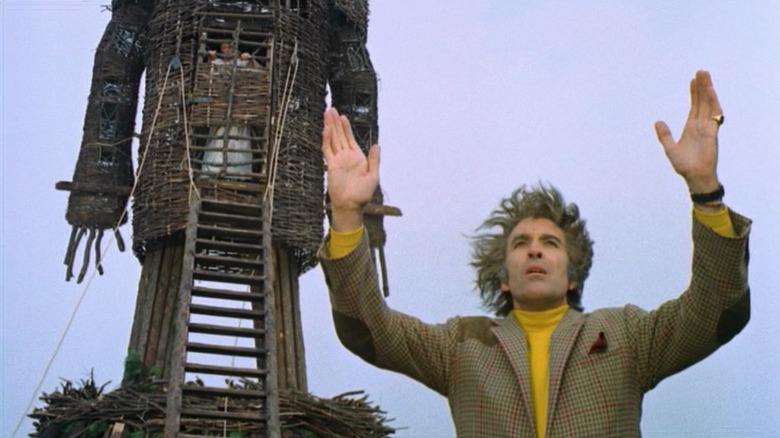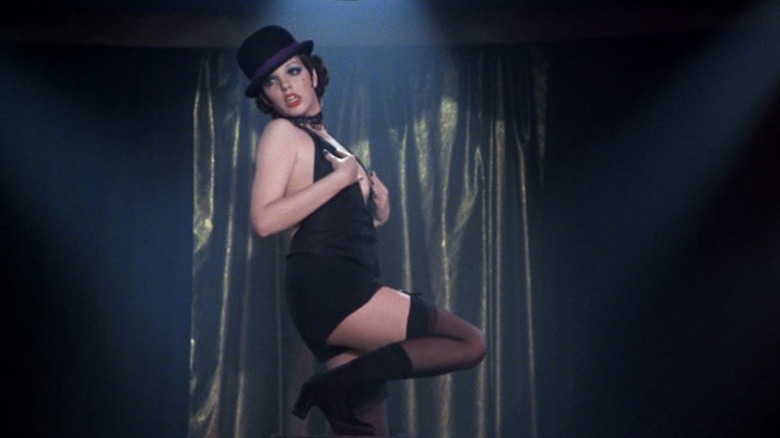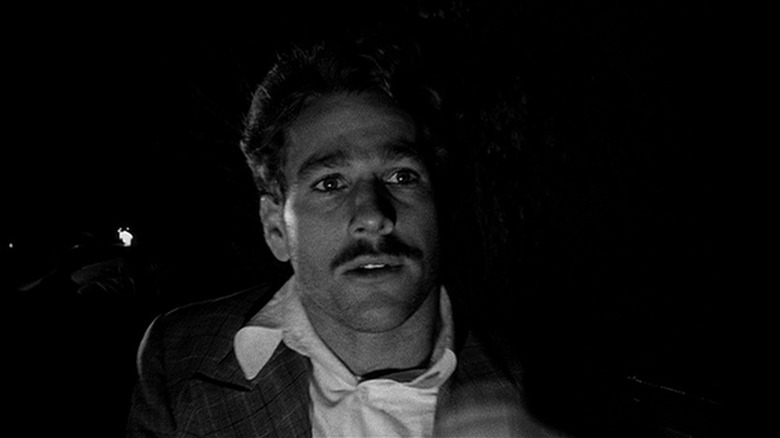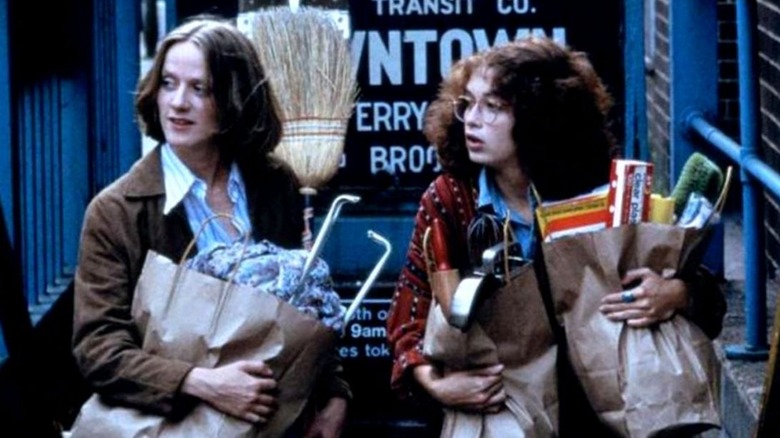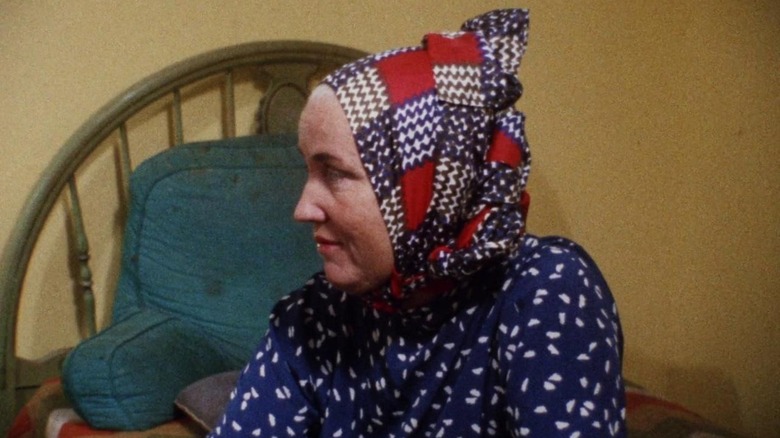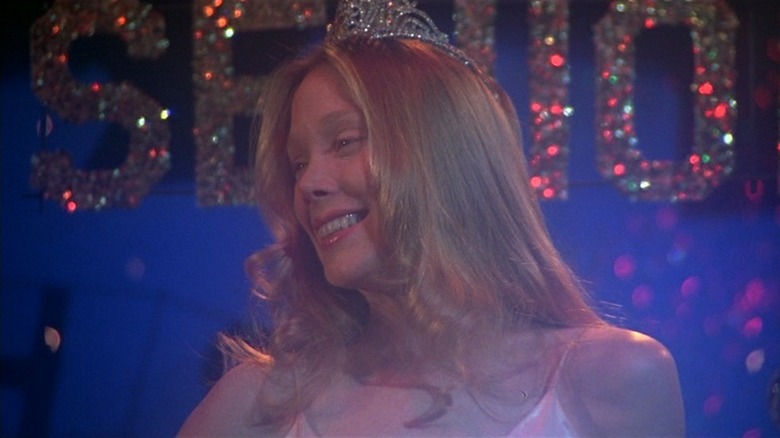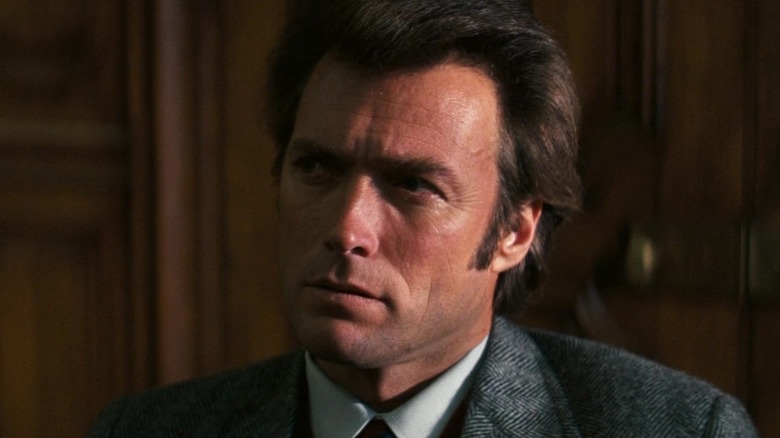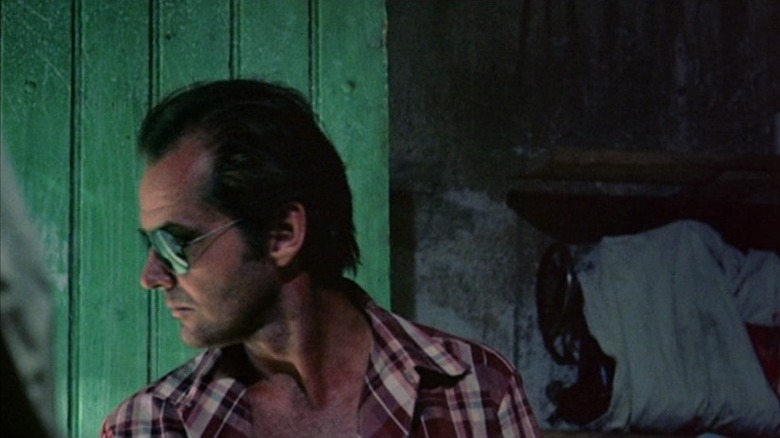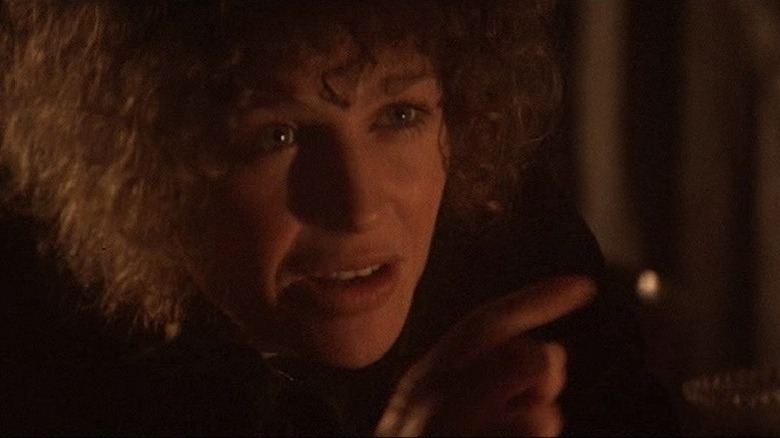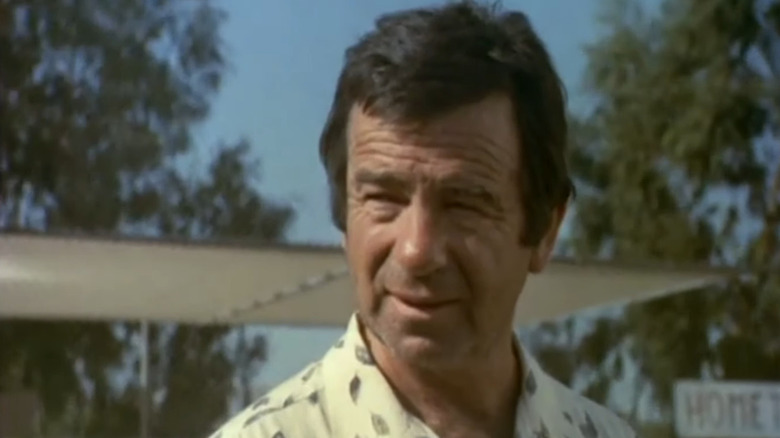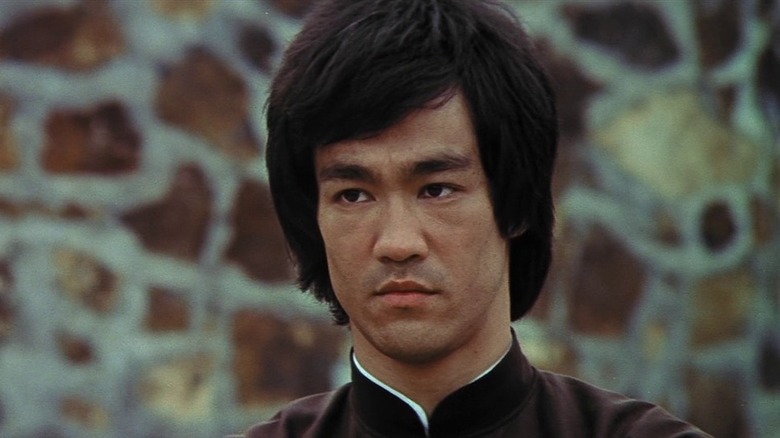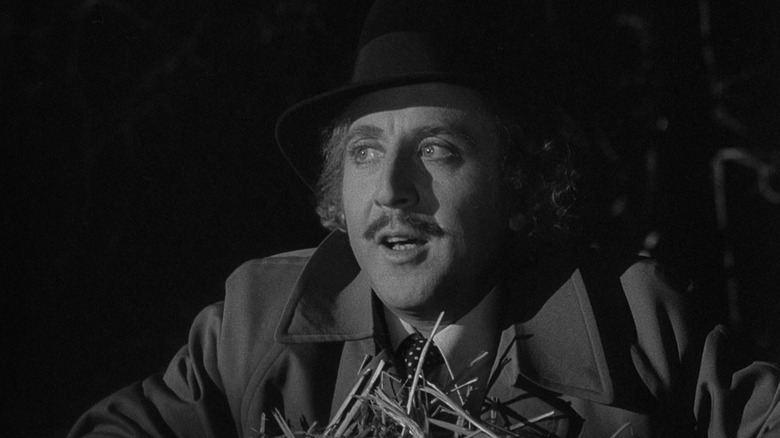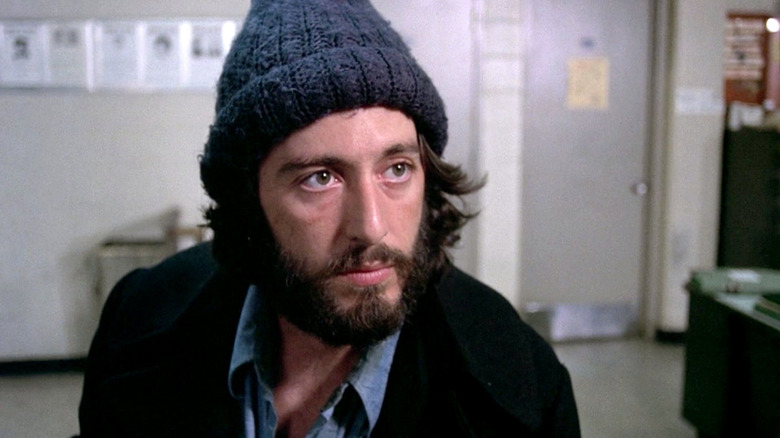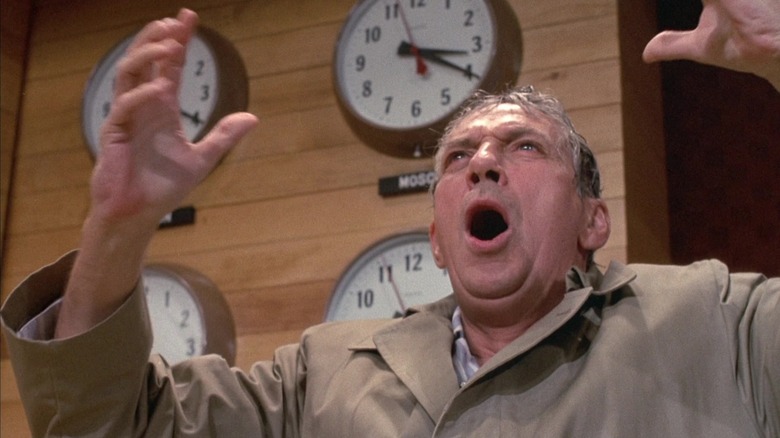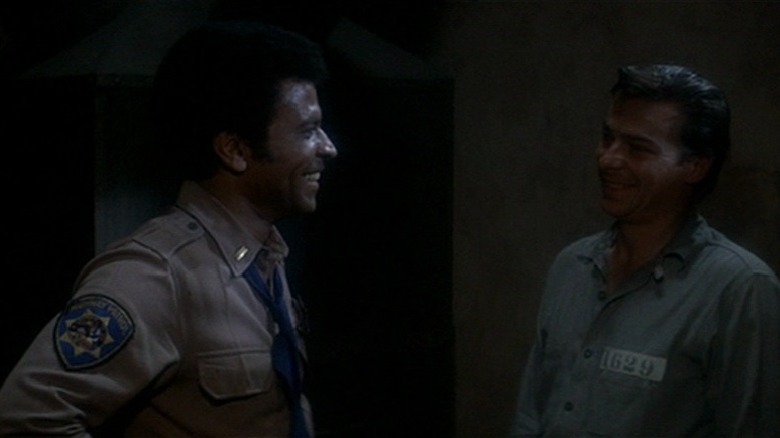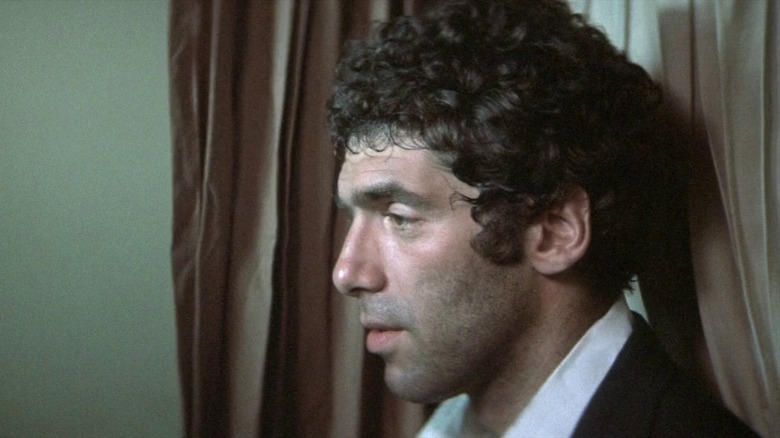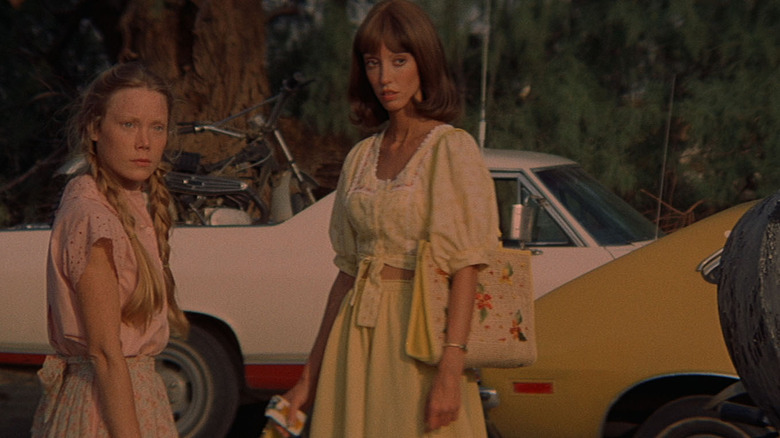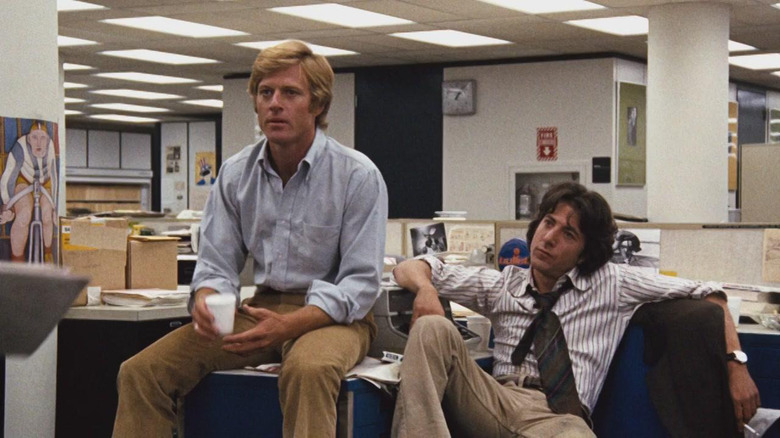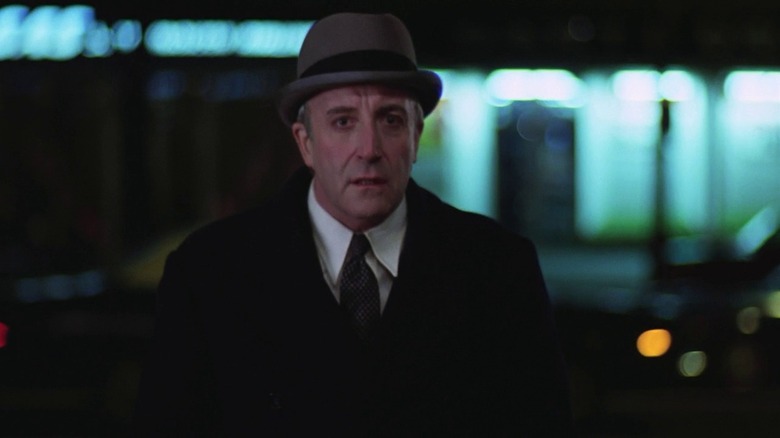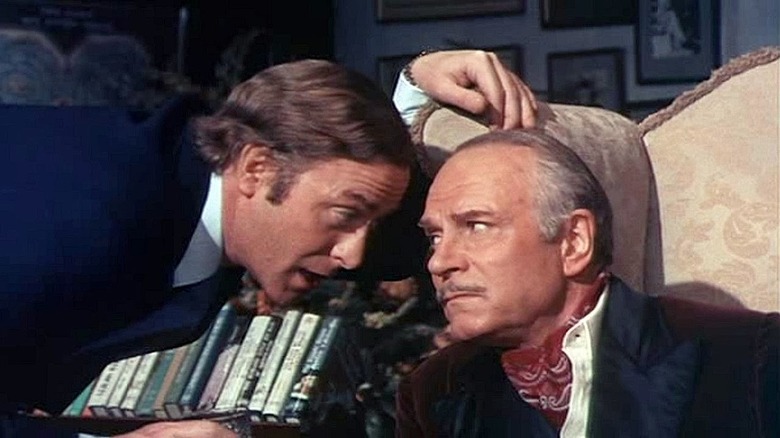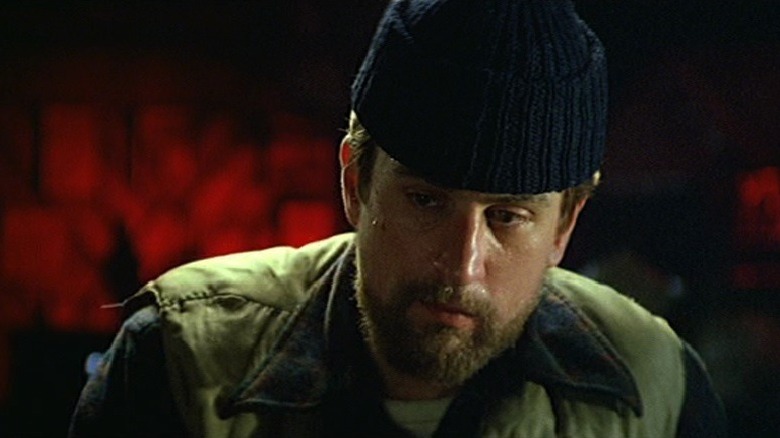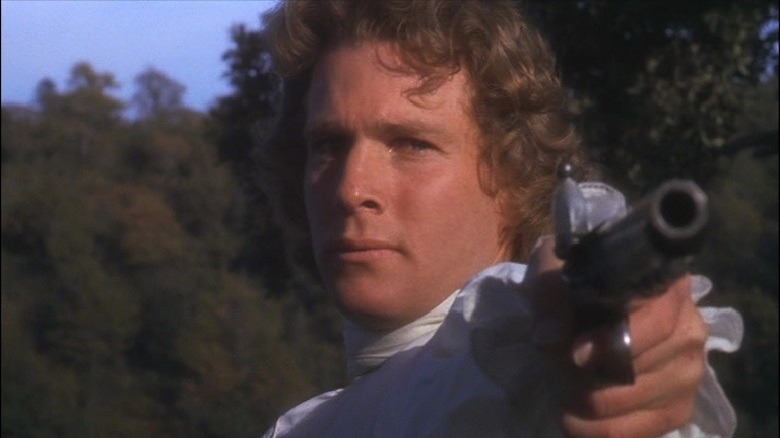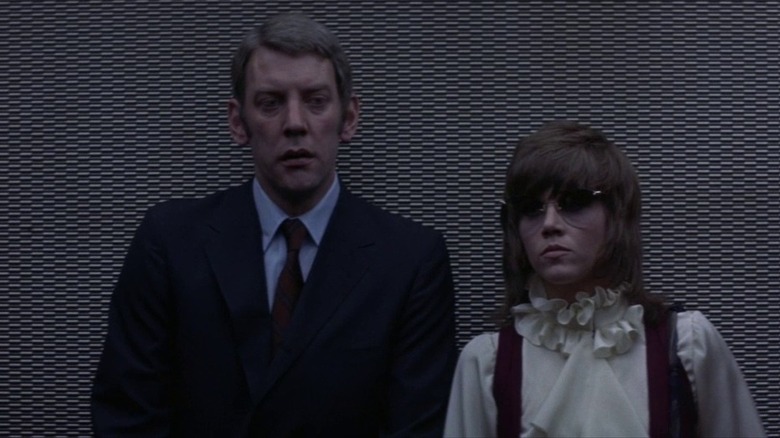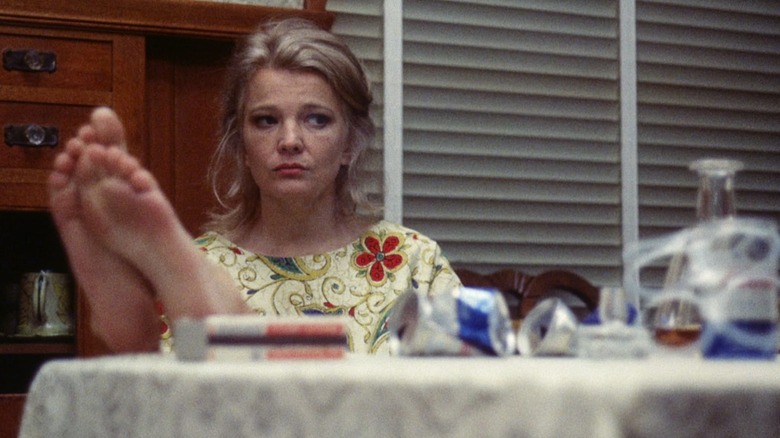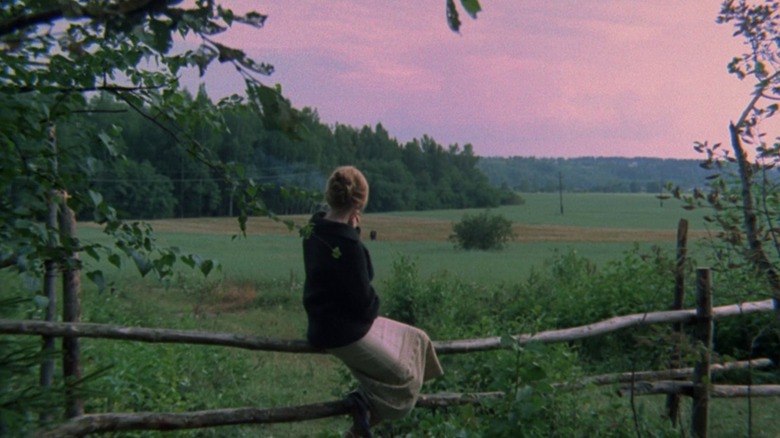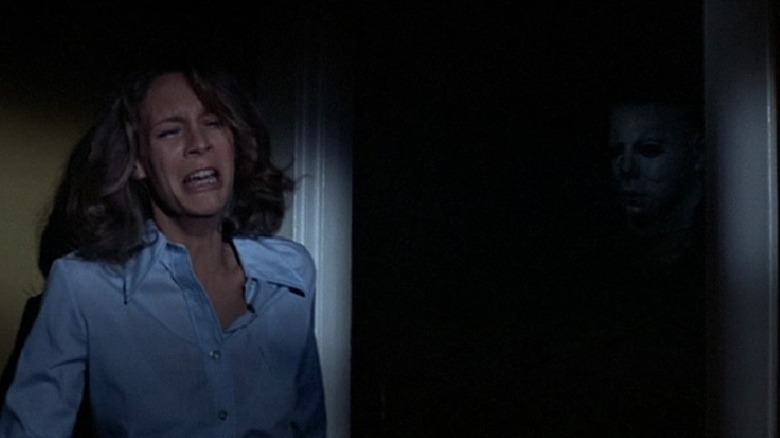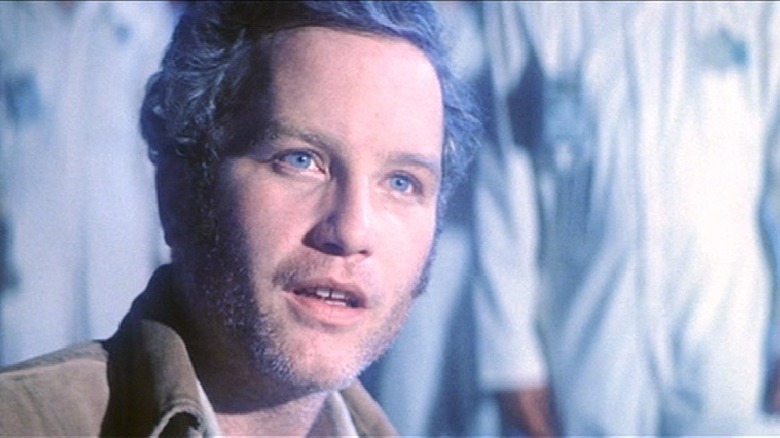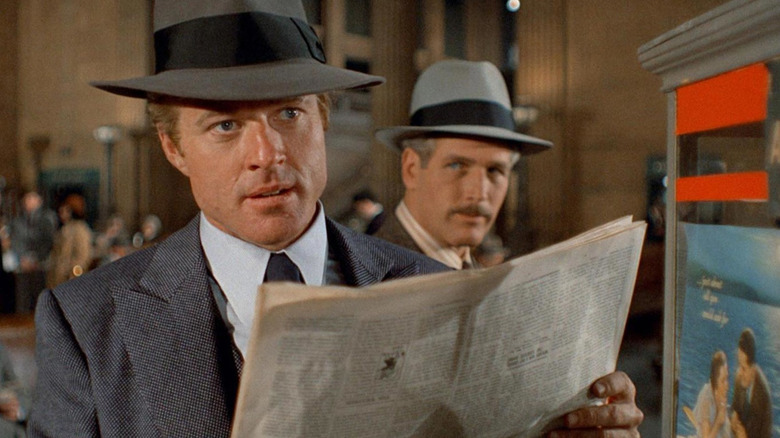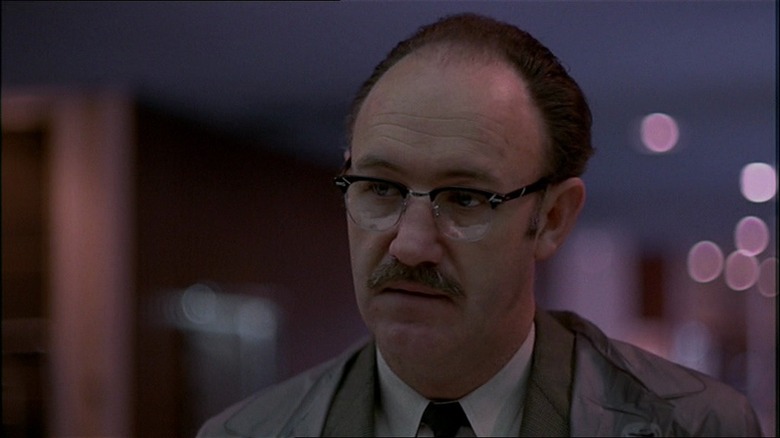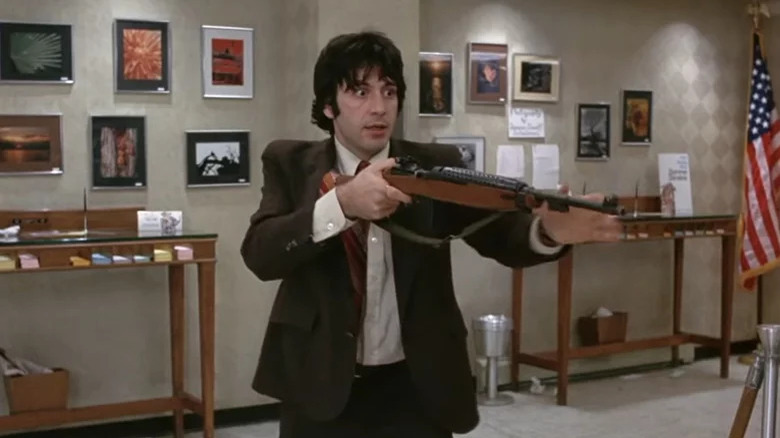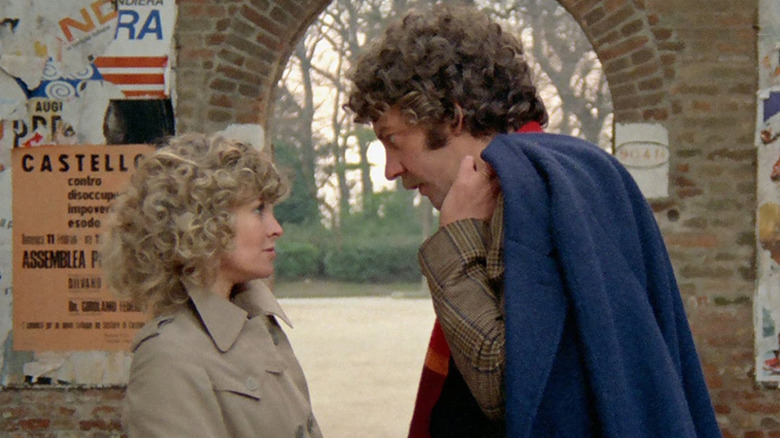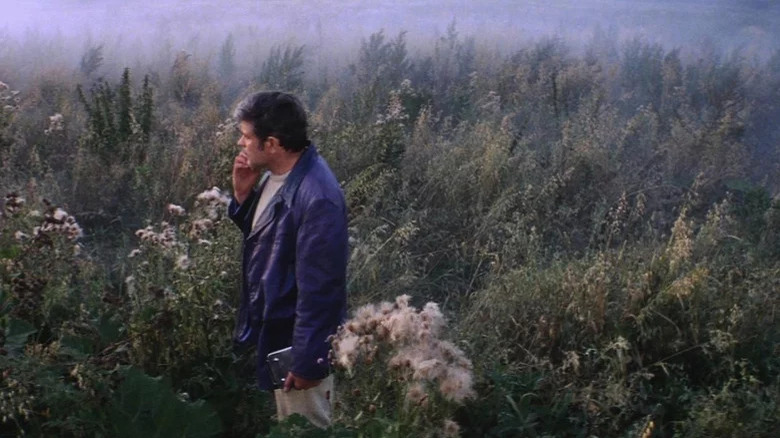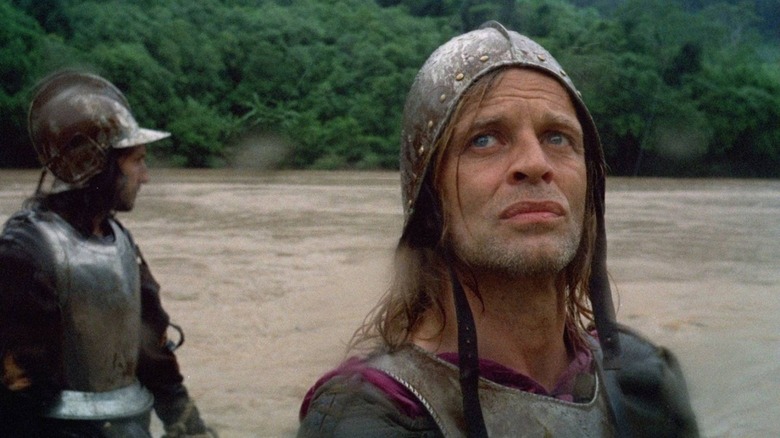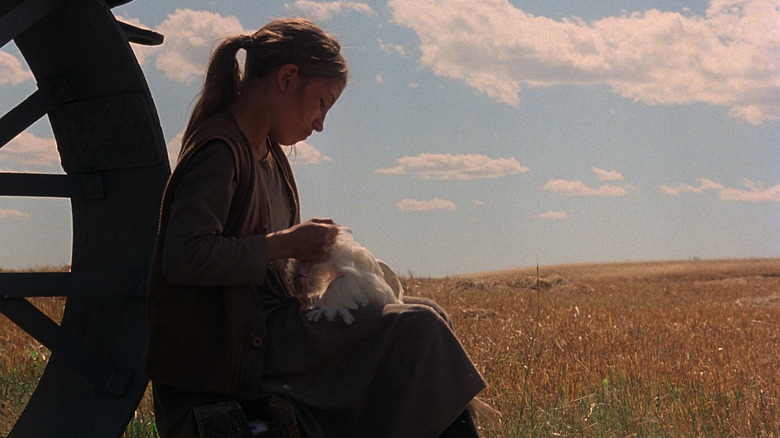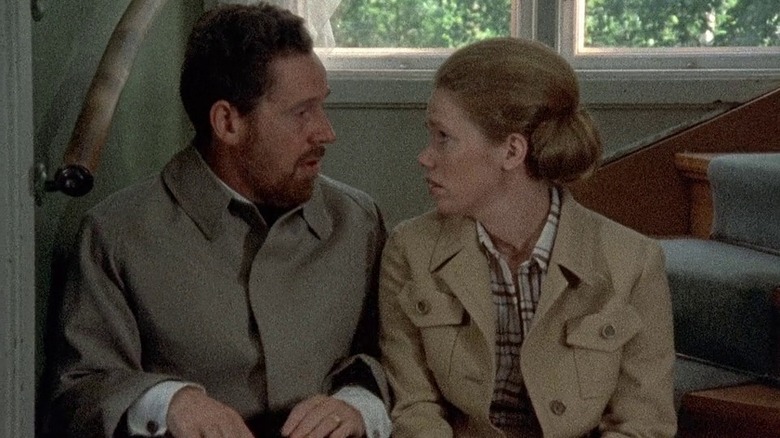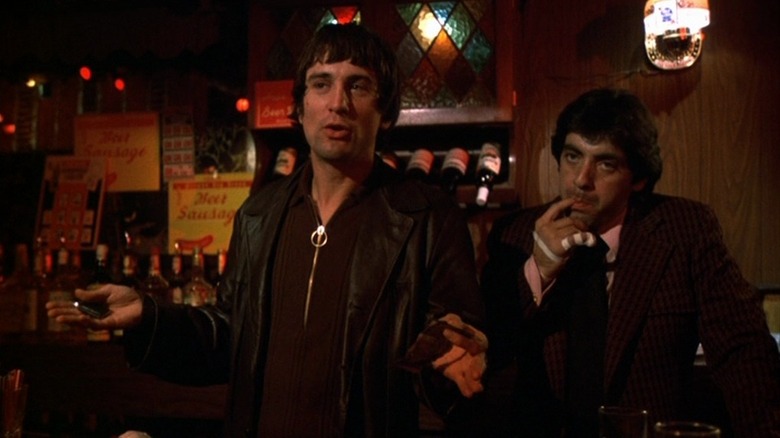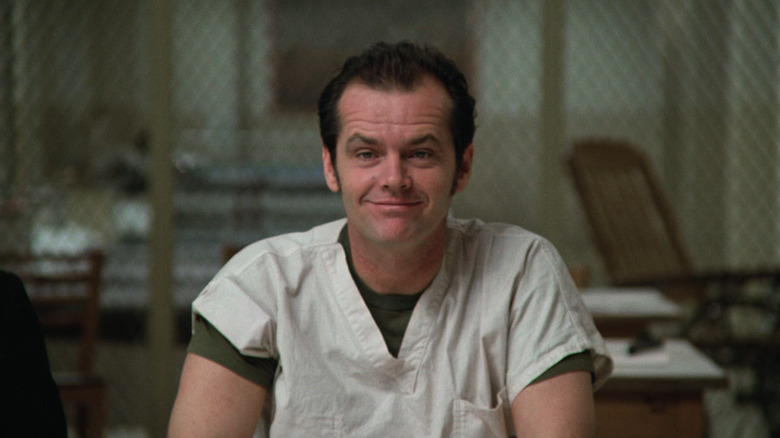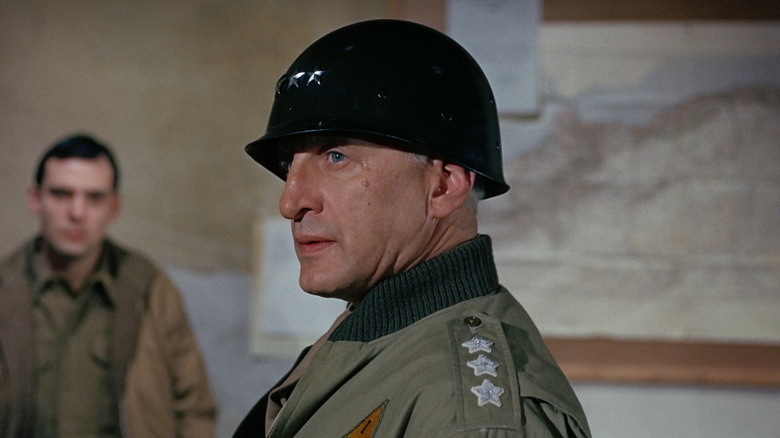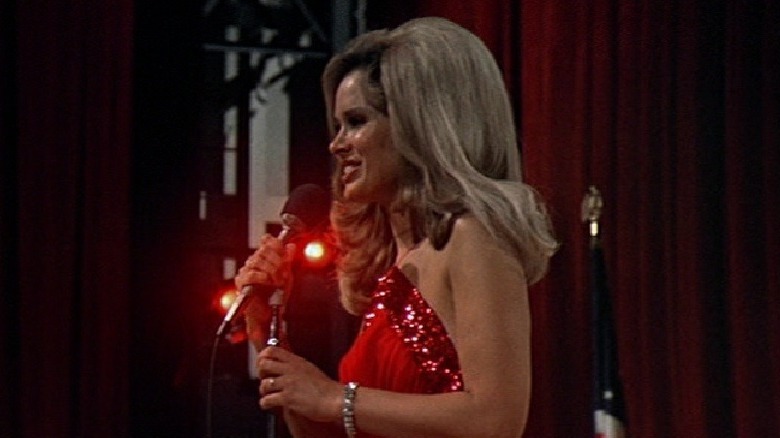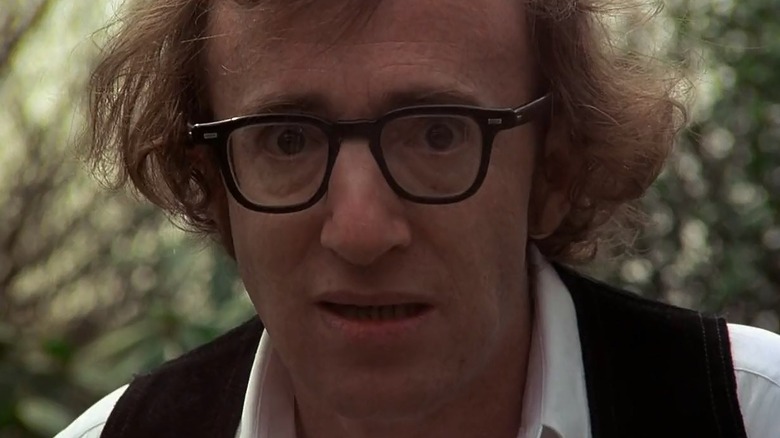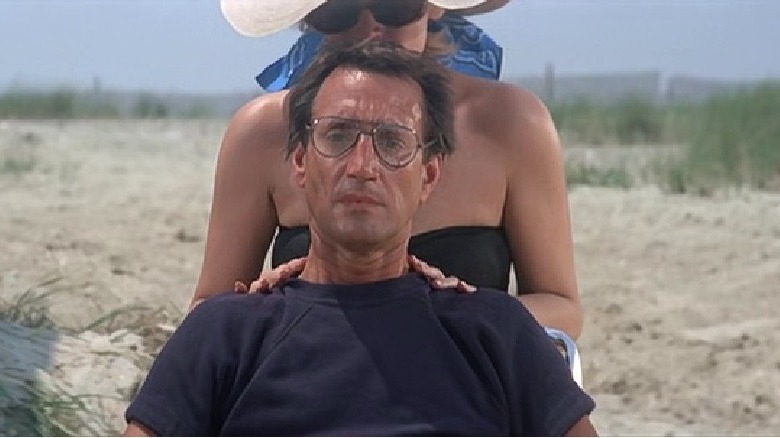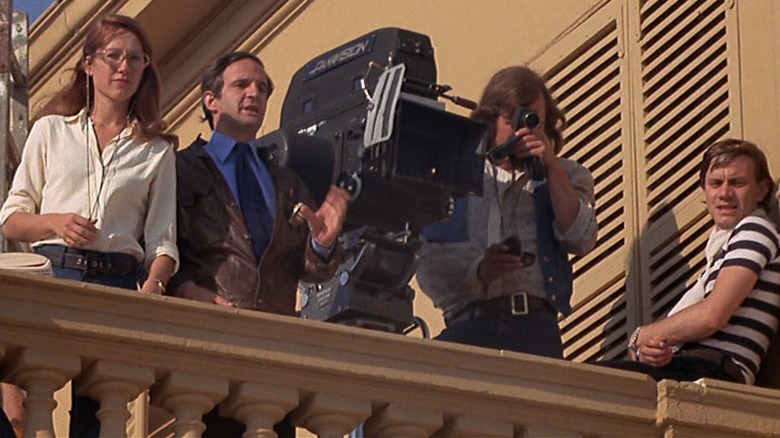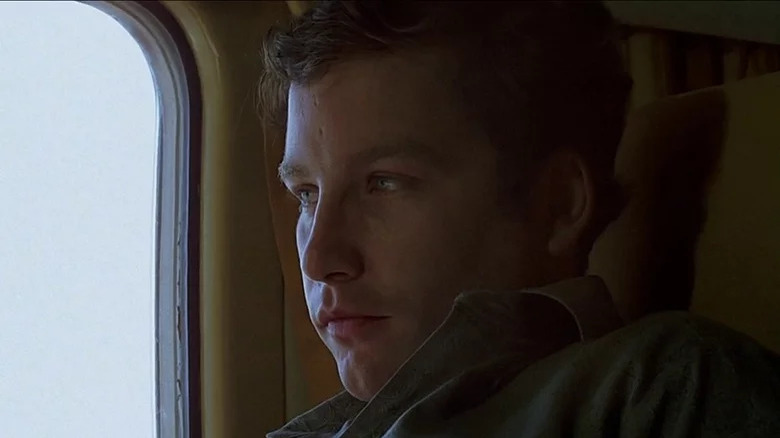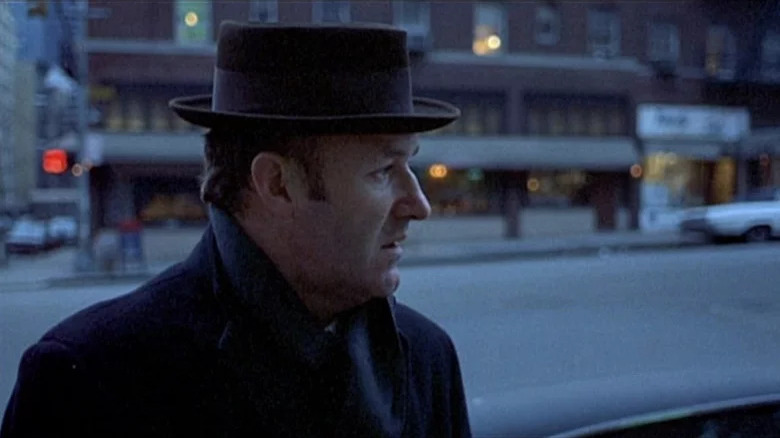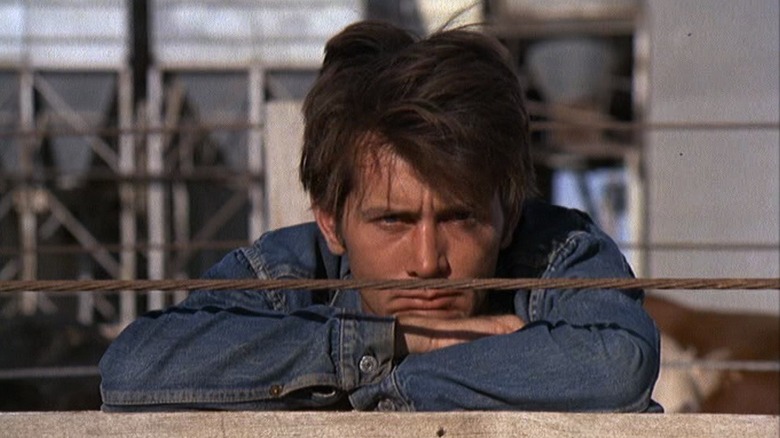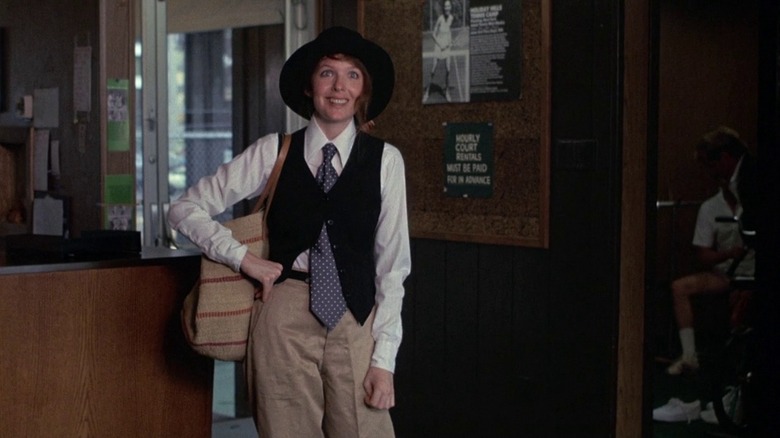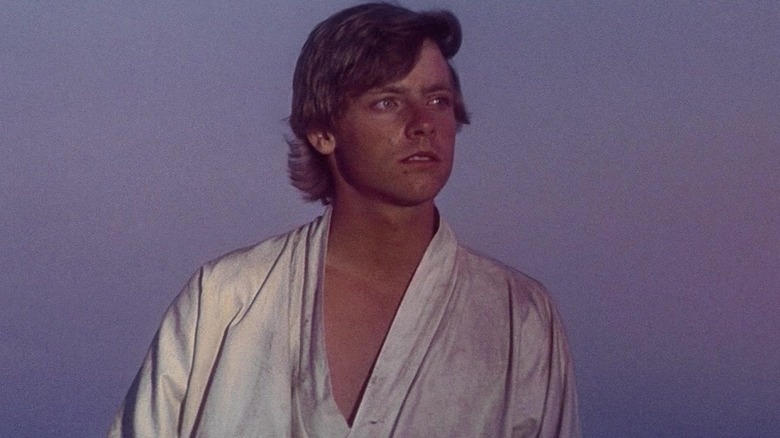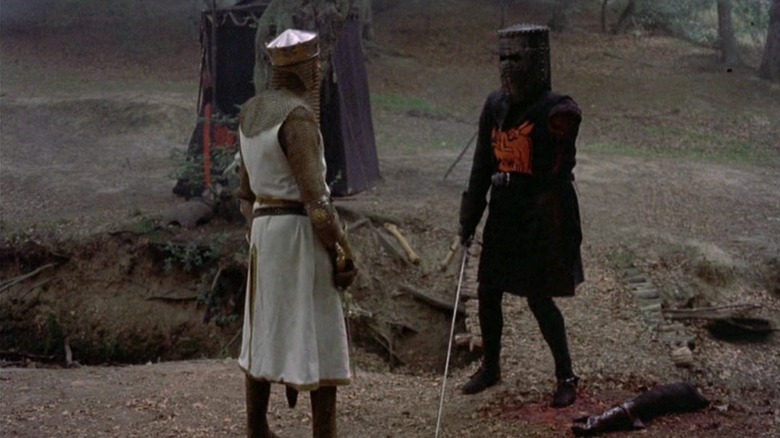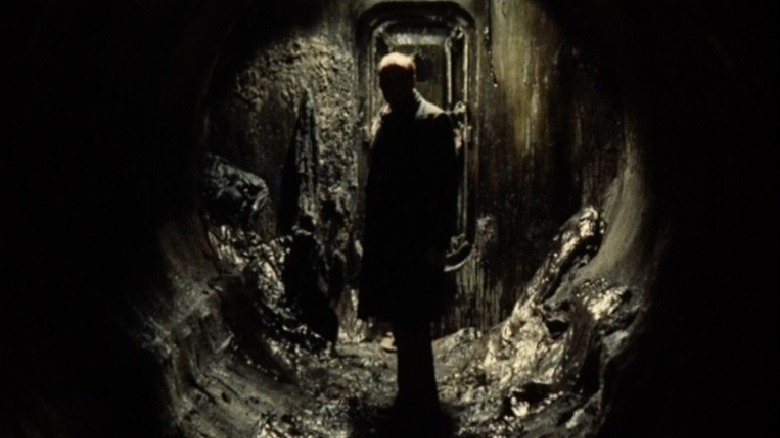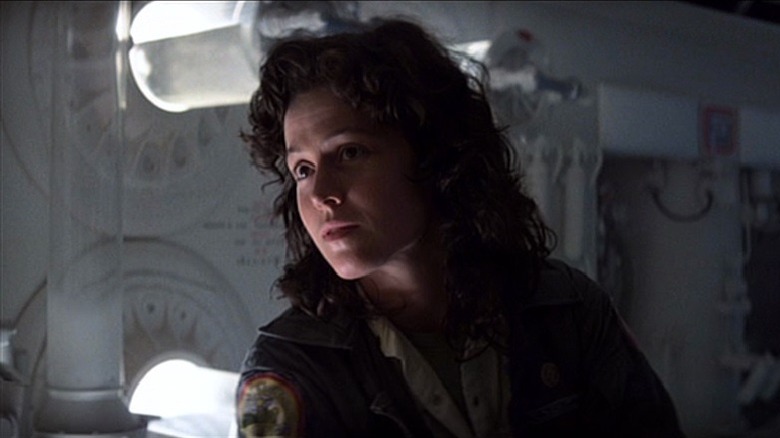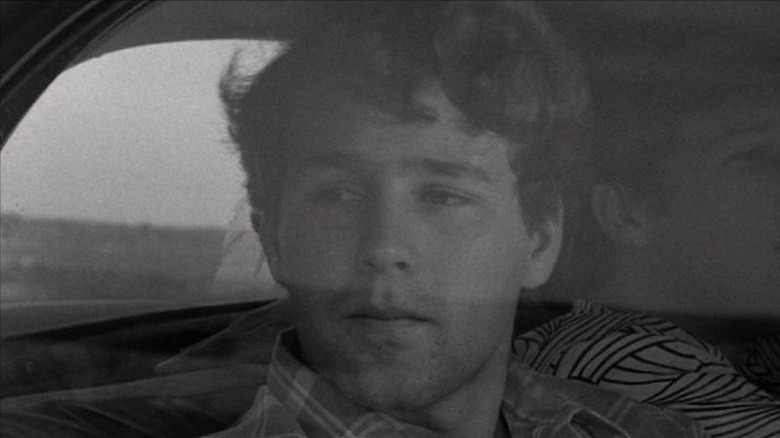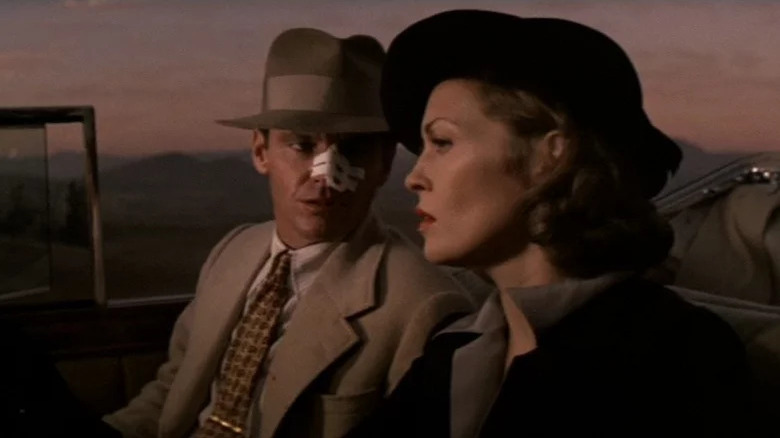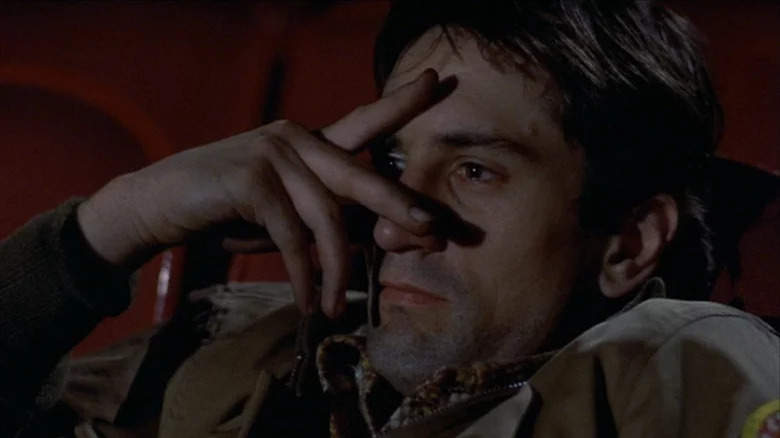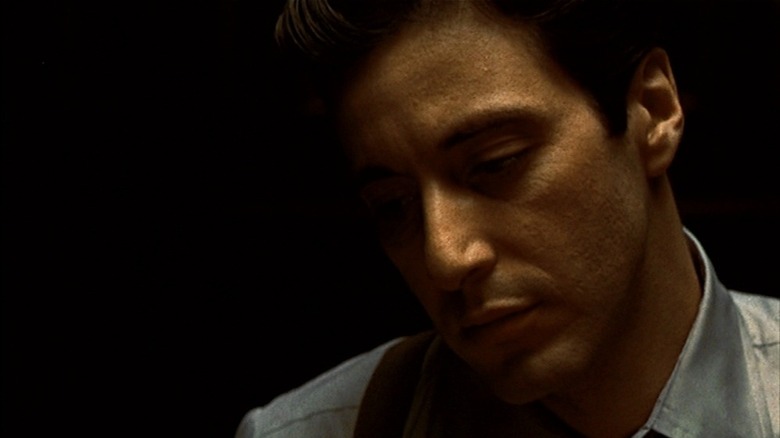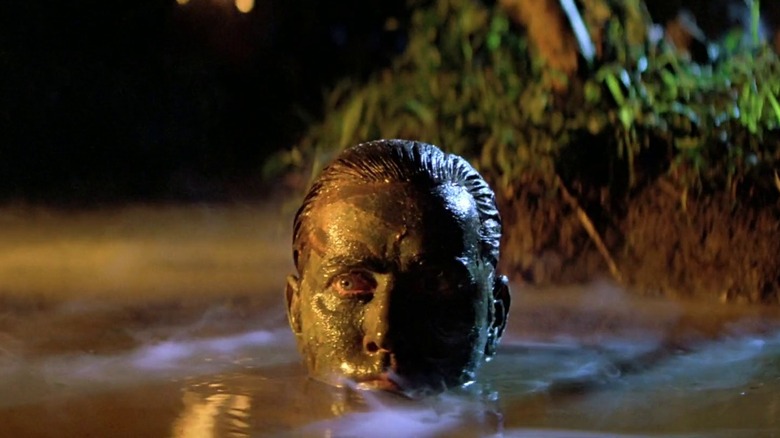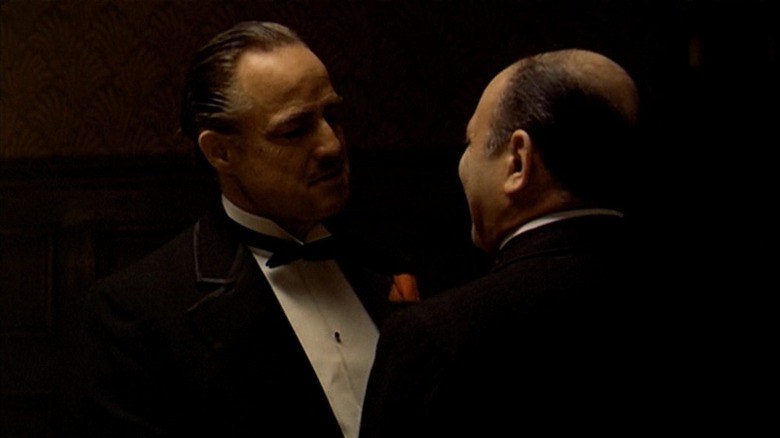95 Best '70s Movies Of All Time Ranked
The "Swinging Sixties" saw the rise of the civil rights movement, advancements in LGBTQ+ rights in the wake of the Stonewall Riots in 1969, and huge historically significant events such as the moon landing, also in 1969. Following this, the 1970s was a decade of great change with key events such as the growing anti-war sentiment against the controversial conflict in Vietnam, and the Watergate Scandal proving to be influential in all facets of society, including cinema.
As is usually the case, movies can be a mirror of what is happening at the time, and the 1970s proved to be a hugely varied decade for cinema. It was a period that saw greater diversification in Hollywood with Blaxploitation films such as "Shaft" and "Coffy," and martial arts films including "Enter the Dragon" and "Drunken Master" increasing in popularity and becoming more mainstream.
While you can find wonderful examples of every genre imaginable in the 1970s, it is perhaps best known for two key areas: gritty films with frequently bleak endings and the rise of the blockbuster. The 1970s was a challenging time in social history, and while this was reflected in the often pessimistic cinematic output, the big blockbuster, crowd-pleasing films were also there to provide the perfect escapism. Whatever film you are in the mood for, this iconic era has got you covered, so join us as we take a look at the 95 best movies of the 1970s.
95. The Rocky Horror Picture Show
Paying tribute to schlocky science fiction and horror B movies, "The Rocky Horror Picture Show" is a provocative, subversive, and perverted musical comedy that features a standout performance from Tim Curry as the mad scientist, Dr. Frank-N-Furter. The fun starts when loved-up young couple Brad (Barry Bostwick) and Janet (Susan Sarandon) stumble across the home of Dr. Frank-N-Furter while stuck in a storm with a flat tire.
With a number of memorable songs including "Sweet Tranvestite" and "Time Warp," "The Rocky Horror Picture Show" is a singularly unique musical that has now become a cult classic. Upon its release, the film was a flop and was pulled from several theaters due to a lack of audience interest. In 1976, a year after the film's release, "The Rocky Horror Picture Show" was revived as a midnight movie and its popularity grew from there, with audience participation encouraged and many fans coming to screenings in costume. According to the BBC, the film has since grossed over $170 million in addition to becoming the longest continually running movie release in history.
94. Shaft
If you haven't seen this classic Blaxploitation flick, you will almost certainly have heard the theme song by Isaac Hayes, which won the Oscar for best original song for "Shaft." Richard Roundtree stars in the film as the effortlessly cool detective, John Shaft, who is hired by mobster Bumpy Jonas (Moses Gunn) to find his kidnapped daughter.
With memorable dialogue and characteristically over-the-top fight scenes, "Shaft" is a film that packs a punch and ultimately succeeds through the charismatic screen presence of Richard Roundtree as the titular protagonist. Like many Blaxploitation films, "Shaft" takes its inspiration from the '40s crime capers and film noirs, injecting a fresh flavor and energy to the genre that proved to be hugely popular in the 1970s. "Shaft" also proved to be a hit with audiences, making over $12 million off a meager budget of just $500,000.
93. Sorcerer
While director William Friedkin's other prominent films from this decade — namely "The Exorcist" and "The French Connection" — may have been considerably more successful, 1977's "Sorcerer" is a film that has earned a reputation over the years as being one of the greatest suspense thrillers ever made. A remake of the 1953 film "The Wages Of Fear," "Sorcerer" follows a similar narrative with four men on the run and marooned in a desolate South American village.
Led by former gang member Jackie Scanlon (Roy Scheider), they embark on a hazardous 200-mile journey to transport two truckloads of volatile nitroglycerin to extinguish a raging oil well fire. If they succeed, they will be paid $10,000 to buy their freedom out of there. With a series of well-constructed and nail-biting set-pieces — including a stunning sequence on an unstable rope bridge — "Sorcerer" is a masterclass in tension with a thought-provoking ending, distinctly lacking in emotion or remorse. It may not have received the same plaudits as Friedkin's other films, but "Sorcerer" is a riveting watch and well worth seeking out.
92. Harold and Maude
The 1970s was a decade for boundary pushing, and nowhere is that more prevalent than in the darkly comedic "Harold and Maude." In the film, Harold (Bud Cort) is a sardonic 19-year-old with an unhealthy fascination with death, and Maude (Ruth Gordon) is an eccentric 79-year-old with a zest for life. The two strike up an unlikely friendship that soon develops into something more romantic.
While on paper, Harold and Maude's relationship is overtly taboo-breaking, there is a surprising sweetness to their pairing as well, with Maude helping the morbid Harold to live life to the fullest. Largely due to its twisted and strange story, "Harold And Maude" was both a critical and commercial failure at the time, not making a profit until 12 years later (via The New York Times). Subsequently critically reassessed, the film now holds a certified fresh rating on Rotten Tomatoes and was given a Criterion release in 2012.
91. Saturday Night Fever
The 1970s was also a big era for music, and the one film that epitomized the rising popularity of disco music during this period was 1977's "Saturday Night Fever." In the film, John Travolta plays Tony Manero, a man with a dead-end job who still hasn't moved out of his parent's house. On the weekends, however, he comes alive when he goes to the disco with friends to show off his moves. When he chooses to compete in a big dance competition, he pairs up with Stephanie (Karen Lynn Gorney), and it isn't long before a romantic spark develops between them as well.
While he had made his name on the sitcom "Welcome Back, Kotter," it was "Saturday Night Fever" that made a star out of John Travolta, who also received an Oscar nomination for his role in the film. With the dance sequences being particularly memorable — demonstrating Travolta's dancing skills as well as his acting prowess — it isn't a surprise that the music plays an important part in the film, with the songs provided mostly by the Bee Gees. The soundtrack was a huge hit, selling more than $15 million copies in the U.S. and going on to become the second best-selling movie soundtrack of all time behind "The Bodyguard" (via Audicus).
90. The Warriors
Arriving at the tail-end of the decade, "The Warriors" takes place in a dystopian New York where Cyrus (Roger Hill) — leader of the Gramercy Riffs gang — gathers the city's street gangs together to encourage them to unite and take over the city. When Cyrus is killed, the gang known as the Warriors are blamed, leading to an eruption of violence. As chaos breaks loose, the night turns into a fight for survival as each gang tries to return to the safety of their own turf, while taking down whoever stands in their way.
While it has dystopian undertones, there is stark realism in "The Warriors," with gang culture prevalent — particularly in New York — during this decade. In 1973, the New York Times reported that "the gangs have unleashed a reign of terror," particularly in the South Bronx area, so while the violence in "The Warriors" may seem pulpy or exaggerated, there is an element of truth to it. For this reason, perhaps, the film really resonated with audiences, making just under $22.5 million at the box office.
89. The Man Who Fell to Earth
Sold on the star power of David Bowie — who was one of the most popular artists in the late '60s and early '70s — "The Man Who Fell to Earth" marked the singer's first major film appearance. He plays Thomas Jerome Newton, an alien who arrives in New Mexico to find water for his home planet, using the advanced technology of his home planet to accrue wealth in order to achieve this — something that brings him to the attention of rival corporations and government operatives. While on Earth, Thomas also meets and falls in love with hotel clerk Mary-Lou (Candy Clark), who teaches him some of what it means to be human.
As a singer, Bowie was known for frequently being able to reinvent himself and inhabiting characters such as Ziggy Stardust and the Thin White Duke, and it is this that makes him an inspired choice to play an alien inhabiting a human body. Due to its hypnotic qualities and surreal visuals, "The Man Who Fell To Earth" went on to become a cult classic, with audiences drawn to its experimental and meditative story.
88. Straw Dogs
When the unassuming, bespectacled David Sumner (Dustin Hoffman) marries beautiful Englishwoman Amy (Susan George) in "Straw Dogs," the pair move from America to a rural Cornish town for a quieter and more relaxed pace of life. When they arrive, David is singled out by the locals, perceiving him as having undeservedly taken one of their own. As things begin to escalate, and Amy and David become the targets of more extreme attacks, David takes matters into his own hands to protect his house.
Attracting controversy due to its depictions of sexual assault, "Straw Dogs" was subjected to edits to pass for censors. While cut in the United States, the U.K. took a much more hardline approach, and the film wasn't released uncut on home media until 2002 (via BBFC). The 1970s was undoubtedly an era for testing the limits, and despite the extreme, visceral elements of "Straw Dogs," it was one of the most impactful films of the decade.
If you or anyone you know has been a victim of sexual assault, help is available. Visit the Rape, Abuse & Incest National Network website or contact RAINN's National Helpline at 1-800-656-HOPE (4673).
87. Last Tango in Paris
When grieving hotel owner Paul (Marlon Brando) meets Frenchwoman Jeanne (Maria Schneider) following his wife's death in "Last Tango in Paris," the pair seem to have instant chemistry and they embark on a passionate, carnal affair. While they initially want to retain a level of anonymity and do not reveal anything about themselves to each other — including their names and personal circumstances — they start to realize that their ignorance of each other cannot go on.
In its depiction of sexual violence, "Last Tango in Paris" was another '70s film that caused an outcry, leading to censorship in some countries, and an X rating from the MPAA — something that drastically limited the number of people that could see it. This didn't seem to affect the film's commercial success, however, and its notoriety and the subsequent media frenzy surrounding it pushed more people to go and see it. In the wake of the #MeToo movement, the fresh controversy started to surround the film when it was revealed that Maria Schneider had not been made aware of exactly what the controversial butter scene would entail (via El Mundo de Alycia). While this has tarnished the legacy of the film, it has opened up the conversation and led to progressive changes to protect the welfare of actors, such as the introduction of intimacy coordinators (via The Hollywood Reporter).
If you or anyone you know has been a victim of sexual assault, help is available. Visit the Rape, Abuse & Incest National Network website or contact RAINN's National Helpline at 1-800-656-HOPE (4673).
86. Play Misty for Me
Marking his directorial debut, Clint Eastwood also stars in "Play Misty for Me" as radio D.J. Dave Garver, who meets a woman called Evelyn Draper at a nightclub (Donna Mills). While he believes she is just a random girl, he later learns she is an obsessive fan who repeatedly calls his show and asks them to play the jazz song "Misty." After they sleep together, they start to casually see other, despite the fact Garver is in a relationship with his girlfriend Tobie (Donna Mills). Enraged by the idea that she can't be with him, Evelyn's behavior quickly turns erratic, and the question emerges of how far she will be prepared to go.
While at times it is a little formulaic, "Play Misty for Me" is nonetheless a highly effective psychological thriller, with Donna Mills' deranged performance as Evelyn Draper being genuinely frightening. The film hit the right notes with the critics, including Roger Ebert for the Chicago Sun-Times, who wrote it "is not the artistic equal of 'Psycho,' but in the business of collecting an audience into the palm of its hand and then squeezing hard, it is supreme."
85. Willy Wonka and the Chocolate Factory
Providing audiences with a golden ticket to "a world of pure imagination," this fantastical confectionary musical follows young Charlie Bucket (Peter Ostrum) — a boy from a poor background who wins the opportunity to take a tour through the reclusive Willy Wonka's (Gene Wilder) famous chocolate factory. With just a hint of darkness underpinning it, the triumph of Charlie Bucket is the ultimate underdog story in "Willy Wonka and the Chocolate Factory," and he is the audience's relatable gateway to the lurid, yet wonderfully weird world of Wonka.
Gene Wilder's star turn as the titular candy king is legendary, equal parts charming, enigmatic, and manic, making him the perfect fit for the character. With a host of memorable songs and the wonderful message that kindness and generosity should succeed over greed and narcissism, it is a film overflowing with nostalgia and joy. While it wasn't a huge box office success, it gradually built cult status over time with the boost from home media sales.
84. All that Jazz
Written and directed by the legendary Bob Fosse, this semi-autobiographical film focuses on pill-popping choreographer Joe Gideon (Roy Scheider) as he struggles to balance editing a film he has directed with staging his latest Broadway musical. An intense perfectionist, womanizer, and reliant on a cocktail of drugs, Gideon's hedonistic lifestyle begins to take its toll in "All that Jazz."
Roy Scheider's performance is nothing short of extraordinary, and throughout the film, you really get the sense of him becoming worn down, as the pressures of his work and the self-inflicted neglect of his health overwhelm him. With hypnotic dance sequences — both real and imagined — "All that Jazz" is a mesmerizing and hypnotic character study of a troubled and charismatic figure. The film proved to be a huge hit with audiences and received nine Oscar nominations, winning in four categories including best original score and best editing.
If you or anyone you know is struggling with addiction issues, help is available. Visit the Substance Abuse and Mental Health Services Administration website or contact SAMHSA's National Helpline at 1-800-662-HELP (4357).
83. The Muppet Movie
While they have now had a number of feature films under their belt, 1979's "The Muppet Movie" was the first big-screen adventure for Jim Henson's popular puppets. With all your favorite characters along for the ride, "The Muppet Movie" sees Kermit traveling from Florida to California to try and become a Hollywood star. Along the way, he picks up the likes of Fozzie Bear, Gonzo, and of course, Miss Piggy, who also have dreams of stardom. Standing in their way is the villainous restauranter Doc Hopper (Charles Durning) who wants Kermit to be the spokesperson of his floundering chain of frog-legs restaurants.
With the trademark meta-humor, and a slew of celebrity cameos, "The Muppet Movie" represents the great and the good of their television series, "The Muppet Show," but with the added bonus of a great story that ties everything together. The film was a box office smash, making over $65 million worldwide off a budget of $8 million, and picked up two Oscar nominations for best original song and best score.
82. Mad Max
Set in a dystopian future in Australia, "Mad Max" features a world wherein the depletion of precious oil supplies has resulted in a chaotic, lawless society, and every day becomes a fight for survival. When what remains of the police force tries to take down a biker gang, things become personal for Max (Mel Gibson) after they murder his wife and son. With nothing left to live for, Max exacts his bloody revenge on the desolate roads in the outback.
George Miller's stunning film is a distinctly low-budget affair compared to 2015's "Mad Max Fury Road," but that is part of its charm. "Mad Max" feels reminiscent of a spaghetti western in places, with the complicated protagonist embarking on a one-man revenge mission against those who wronged him. The high-octane car chases are among some of the very best, and the often brutal and visceral action scenes feel wrought with emotion even as Max evolves into a cold-hearted killing machine.
81. Blazing Saddles
A hilarious pastiche of Westerns, "Blazing Saddles" has elements that haven't aged well, but it remains as funny now as it was in 1974 when it was released. When plans emerge to build a railroad through the small frontier town of Rock Ridge, greedy attorney general Hedley Lamarr (Harvey Korman) sends his thugs to rid them of their Sheriff so he can assume power and reap the millions the railroad will bring. Tasked with finding a new Sheriff to protect the town, Governor William J. Le Petomane (Mel Brooks) is convinced by Lamarr to hire black railroad worker Bart (Cleavon Little) — a deliberate power play to bring chaos to the town so he can take over.
Bart's presence causes an uproar in the racially prejudiced town, however, through his friendship with gunslinger Jim (Gene Kelly), they start to come around to the idea when the town comes under attack. Vulgar, crass, and often outrageous, "Blazing Saddles" may be an acquired taste but its relentless and manic energy ensures the laughs come thick, fast, and consistently. With largely positive reviews from critics, "Blazing Saddles" success was cemented when it was nominated for three Academy Awards, for best actress, best original song, and best film editing.
80. Alice Doesn't Live Here Anymore
While it has its moments, "Alice Doesn't Live Here Anymore" is a distinctly warmer affair than Martin Scorsese's other '70s output. The film focuses on the titular woman (Ellen Burstyn), an aspiring singer who, along with her talkative son Tommy (Alfred Lutter), packs up their life in New Mexico with dreams of heading to California. Running into financial problems, they settle in Arizona, and Alice works as a waitress in a diner to save the money she needs. However, things change when she meets handsome rancher David (Kris Kristofferson).
Through the character of Alice, Scorsese's film beautifully captures the frustration and longing of a woman who feels as though she sacrificed her career for her family, and Burstyn's memorable performance reflects both her sadness and her determination to carve out a new path. Nominated for three Oscars, the Academy recognized the strength of Burstyn's performance, winning the prize for best actress in a leading role.
79. An Unmarried Woman
After Erica Benton's (Jill Clayburgh) marriage comes to an unceremonious end, her world is turned upside down in "An Unmarried Woman." As she processes the betrayal of her husband's infidelity, she takes tentative steps back into the world of dating — something she feels woefully unequipped for — until she eventually meets artist Saul (Alan Bates) and starts to consider whether there could be a future with him.
Jill Clayburgh is revelatory as Erica, and her performance exudes warmth as well as a heartbreaking vulnerability. There are many films that explore this idea of newfound freedom following a marriage breakdown, and while Erica does experience moments of joy through her relationship with Saul, it doesn't ignore the complex emotions she is feeling after a life-altering revelation. While we're willing Erica to find lasting happiness, the film acknowledges that real life isn't always as straightforward as that — something that is keenly felt in the film's bittersweet ending.
78. Kramer vs. Kramer
Where other '70s films such as "An Unmarried Woman" and "Alice Doesn't Live Here Anymore" focus on the female perspective following a relationship breakdown, 1979's "Kramer vs. Kramer" shifts this to focus on the film's husband. After his wife, Joanna (Meryl Streep), leaves him and their son, Billy (Justin Henry), Ted Kramer (Dustin Hoffman) is forced to abandon his career as a high-flying advertising executive and raise his son alone, allowing the two to form a stronger relationship.
Working effectively as both a relationship drama and a courtroom drama, "Kramer vs. Kramer" explores the toll divorce takes on all parties, with the resulting court battle threatening to tear the family apart even further. Ultimately, the film champions the importance of being present, and the evolution of Ted from an absent, work-obsessed man, to a loving father is a joy to watch. With two actors at the peak of their powers, "Kramer vs. Kramer" proved to be a huge success, nominated for nine Oscars and winning five, including prizes for both Streep and Hoffman, best picture, director, and adapted screenplay.
77. Invasion of the Body Snatchers
A remake of the 1956 classic, 1978's version of "Invasion of the Body Snatchers" shifts the action to San Francisco as strange plant pods begin appearing all over the city, assimilating and then duplicating people, transforming them into lifeless alien beings. Donald Sutherland plays Matthew Bennell, a man who works in the San Francisco Health Department and becomes aware of the threat when his colleague, Elizabeth (Brooke Adams), mentions her husband's behavior has suddenly changed. As similar reports start to crop up throughout the city, Bennell faces a race against time to work out what is happening and how to stop it.
As much as the original was about the post-war paranoia in America at the time — particularly the fear surrounding covert espionage — the remake is a distinctly '70s affair, reflecting a new era of paranoia and distrust in the government in the wake of Vietnam and the Watergate scandal. In addition to leaning more into the body horror elements, this version also expands on the themes, giving commentary on the shifting time period, in which the '60s freedom of expression has evolved into a decade of conformity. The haunting final scene of Sutherland's contorted face is an iconic movie moment and one that will live with you for a long time afterward.
76. Fantastic Planet
While the animation giant that is Disney suffered a period of uncertainty in the '70s. following the death of Walt Disney in 1966, the experimental French animated film, "Fantastic Planet," proved the genre was still thriving when you looked a little further outside the mainstream. The film charts the relationship between a race of tiny humans called Oms, who are ruled over by the oppressive blue-skinned creatures called Draags. When one of the Oms bonds with a young female Draag, it sparks a rebellion with the potential to either end with the two factions finding a way to live harmoniously with each other, or a war to determine the stronger group.
"Fantastic Planet" is undeniably surreal and strange, with a deep underlying allegory that in a way reflects the civil rights movement in America that had dominated much of the previous two decades. Providing a welcome palette cleanser to some of the more traditional animated films of the '70s, "Fantastic Planet" was included in Rolling Stone's list of the 40 greatest animated films with the article stating, "the inventive aesthetics alone qualify this one for inclusion on all-time lists such as these."
75. Rocky
Now a multi-film franchise, 1976's "Rocky" was the film that started it all and the first one to introduce Sylvester Stallone as the working-class Philadelphia boxer, Rocky Balboa. Rising up the ranks from the small-time fights to the big leagues, Rocky is selected to fight the world heavyweight champion, Apollo Creed (Carl Weathers) when Creed's original opponent is injured. While undergoing his training with the fiery Mickey (Burgess Meredith), Rocky also begins dating the quiet Adrian (Talia Shire), the sister of his friend Paulie (Burt Young), who gives him the motivation to succeed beyond just being the best.
Often imitated but rarely bettered, "Rocky" is not completely devoid of the cliches that seem to come organically with the plucky underdog story, but it is one of the purer offerings from the franchise, establishing a likable lead character and a surprisingly sweet relationship with the lovely Adrian. "Rocky" is a feel-good, triumphant sports movie classic, with the now-iconic scene of Rocky climbing the steps of the Philadelphia Museum of Art becoming a defining moment of the decade — and changing the way people would run up the stairs forever.
74. The Texas Chainsaw Massacre
Birthing one of the all-time great horror movie villains in the form of the chainsaw-wielding Leatherface (Gunnar Hansen), "The Texas Chainsaw Massacre" is a film that has never lost the power to shock and scare. After learning her grandfather's grave has been vandalized, Sally (Marilyn Burns) and her brother, Franklin (Paul A. Partain), head out with a group of friends to investigate. When they explore the family's old farmhouse, they are terrorized by the group of insane, blood-thirsty neighbors, and what began as a trip down memory lane becomes a desperate battle for survival.
Striking the perfect balance between the grotesque, gory deaths, and the atmospheric moments of extreme tension-building, "The Texas Chainsaw Massacre" is an unrelentingly nerve-wracking experience that masterfully executes its unique blend of extreme horror. It is nasty, boundary-pushing, and set a high bar for not just the '70s slasher movie, but the genre as a whole.
73. The Castle of Cagliostro
Six years before the legendary director Hayao Miyazaki co-founded the beloved animation house, Studio Ghibli, the delightful "The Castle Of Cagliostro" was a sign of the great things to come. Also his feature directorial debut, the film focuses on Arsene Lupin III (Yasuo Yamada), a dashing and daring thief who plans an elaborate casino heist. Upon learning the spoils of the heist are counterfeit, Lupin embarks on an adventure that leads him to the source of the fake bills, the villainous Count Lazare de Cagliostro (Tarō Ishida).
While Miyazaki later became known for the fantastical worlds of favorites such as "My Neighbor Totoro" and the Oscar-winning "Spirited Away," his debut is instead a well-paced and imaginative caper, imbued with a trademark sense of fun and wonder. While it sits outside the canon of Studio Ghibli, "The Castle Of Cagliostro" is still a wonderfully enjoyable film and another shining example of the under-appreciated animated greats that were released in this decade.
72. National Lampoon's Animal House
Outrageous and gut-bustingly funny, "National Lampoon's Animal House" sees a group of socially awkward freshmen trying to get into the haughty Omega Theta Pi fraternity. When they are rejected, they instead approach the riotous Delta Tau Chi House, which becomes the target of college dean Vernon Wormer (John Vernon) who is trying to keep the hard-partying frat boys in check.
As well as being packed with gags and one-liners, "National Lampoon's Animal House" was a real trailblazer, setting a benchmark for the wave of "college" comedies and teen sex comedies that would follow. Without it, we wouldn't have had films such as the "American Pie" franchise, and it embodies a youthful and rebellious spirit that provides a welcome palette cleanser to some of the more serious output of the '70s. Critic Roger Ebert recognized the merit of the film in his review saying, "It's anarchic, messy, and filled with energy. It assaults us. Part of the movie's impact comes from its sheer level of manic energy."
71. Dawn of the Dead
When a horde of zombies begins to surge through America, humanity is forced into a desperate fight for survival against the undead as they struggle to find a place of safety in "Dawn of the Dead." Radio station employee Stephen (David Emge), his girlfriend Francine (Gaylen Ross), and SWAT team members Roger (Scott H. Reiniger) and Peter (Ken Foree) retreat to a shopping mall to make their final stand.
Later hilariously and lovingly lambasted in Edgar Wright's "Shaun Of The Dead," the strength of George A. Romero's "Dawn Of The Dead" lies in the way it utilizes not just everyday people, but everyday locations to terrifying — and frequently amusing — effect. Proving his prowess with the zombie genre in 1968's "Night Of The Living Dead," Romero's '70s contribution incorporated a cynical, satirical, and tongue-in-cheek sensibility, with lashings of dark comedy amidst the zombie carnage.
70. Walkabout
Five years before "The Man Who Fell to Earth," director Nicolas Roeg's poetic and hypnotic "Walkabout" presented a very different kind of survival movie. Lured into the harsh Australian outback by their father (John Meillon), a teenage girl (Jenny Agutter) and her younger brother (Lucien John) are left to fend for themselves after he tries to shoot them before turning the gun on himself. When they encounter an Indigenous boy, they are taught some key survival lessons and learn about the occasionally harmonious and often chaotic relationship between nature and humanity.
"Walkabout" is one of those films that appears to be one thing, but has a lot going on underneath the surface, with the idea of "returning to nature" echoing a Biblical Eden scenario. With vast differences between the two siblings and the Indigenous boy, the film also reflects on the importance of communication, and how basic human survival is something that can transcend any language or cultural barriers. An unusual and artistic meditation on life, "Walkabout" was nominated for the Palme d'Or at the prestigious Cannes film festival, and its status as an underseen cult favorite was cemented with its Criterion Collection release in 2010.
69. Suspiria
It is perhaps fitting in Dario Argento's Giallo horror masterpiece — with the term "Giallo" deriving from the Italian for yellow, the color used in Italian mystery thriller books — that color plays such an important role in the unique visual storytelling of "Suspiria." Lurid, garish, and resembling a technicolor fever-dream, "Suspiria" focuses on young ballerina Suzy (Jessica Harper) who attends a prestigious ballet academy in Germany. As she begins her training, Suze also experiences terrifying and hallucinatory visions, and when fellow student Pat (Eva Axén) is murdered, Suzy discovers something sinister is going on beneath the surface.
Sold on its power to shock and terrify, "Suspiria" remains a bloody, brutal, and brilliant film, with an eye-catching visual palette that makes it easily identifiable from almost any frame. While the initial critical response was mixed, over the years "Suspiria" has subsequently been reassessed, and is now regarded as a cult horror classic. Writing for AllMovie, critic Jason Buchanan called it, "one of the most striking assaults on the senses ever to be committed to celluloid ... this unrelenting tale of the supernatural was — and likely still is — the closest a filmmaker has come to capturing a nightmare on film."
68. House
With a plethora of creative death scenes that appear to have come from the mind of a deranged toddler, trippy Japanese horror "House" is an experience like no other. Irritated by her father's new partner, the young Gorgeous (Kimiko Ikegami) decides to visit her aunt's remote mansion with six of her friends — the aptly named Kung Fu, Prof, Fantasy, Mac, Sweet, and Melody. However, it isn't long before strange and supernatural things start happening, leaving the girls terrified and fighting for their lives.
"House" is a film that has everything: flying severed heads, homicidal pianos, sentient appliances, and a possessed cat. While it may be an acquired taste, the fact it is so unpredictable and surreal means it is as entertaining as it is shocking — a film seemingly destined to become a cult classic based on the premise alone. '70s cinema was constantly pushing the boundaries and testing what it could get away with, and the film's bonkers energy demonstrates what can happen when this is taken to the extreme. A true landmark film and decades ahead of its time, it is a sheer miracle that a film like this even exists.
67. Deliverance
Where a survival adventure movie and horror intersect, you will find 1972's "Deliverance," a film that garnered controversy for its infamous "squeal like a pig" scene, and awards recognition with three Oscar nominations. When four city workers choose to take a canoeing trip to escape the rat race and their families, they find themselves at the mercy of the locals. Following a malice-tinged banjo battle, they take to the water, and things take a dark turn when two mountain men show up.
Heavy with masculine energy, "Deliverance" is a gritty, visceral, and intense film that explores man's primal side, and the brutality they are capable of when pushed to the edge. The contrast between the beautiful scenery of rural Georgia, and the film's more difficult-to-watch scenes reflects the duality of nature that is a prevalent theme throughout. The result is a beautifully shot film that has the power to repulse and scare, leaving audiences both in awe and frightened at how frail humans are compared to nature's wilder side.
66. Duel
While not the '70s film that Steven Spielberg is perhaps best known for, 1971's "Duel" is a masterclass in suspense building, and a sign of the greatness that was to follow four years later. David Mann (Dennis Weaver) is a salesman, driving solo on the highway when an oil tanker — driven by an aggressive unseen driver — tries to run him off the road. Locked in a potentially deadly game of cat and mouse, David desperately tries to evade the truck driver's increasingly erratic behavior, before he realizes he might just need to give them a taste of their own medicine in order to survive.
The beauty of this film is in its simplicity, and just as "Jaws" finds its strength in the man vs. beast idea, "Duel" is a low-budget, stripped-back film about a relentless battle for survival between man and machine. While it was originally a made-for-TV movie, "Duel" is distinctly cinematic, and despite its slim budget, sparse script, and limited cast, it is wonderfully demonstrative of what an audacious and exciting director Spielberg was in this decade — just as his career was about to really take off.
65. Manhattan
More so than any of his other films, Woody Allen's "Manhattan" is as much a love letter to New York as it is a love story, with Allen playing divorced writer Isaac Davis. After his wife, Jill (Meryl Streep), leaves him for another woman, Isaac is struggling with the idea of being middle-aged and alone. While dating high-schooler, Tracey (Mariel Hemingway), he contemplates a relationship with Mary (Diane Keaton), who is having an affair with his best friend, Yale (Michael Murphy).
Bolstered by its excellent screenplay and exceptional performances, "Manhattan" is a funny and bittersweet film that gives an honest depiction of how messy and complicated relationships can be. As the title would suggest, it is a distinctly New York story — and the exquisite cinematography ensures it has rarely looked better — yet there is a universality to it, and a believability to the characters that makes it so charming.
64. The Exorcist
Loosely based on real events, this iconic horror masterpiece from director William Friedkin is now amongst the most profitable — and notorious — horror movies ever made. When young girl, Regan (Linda Blair), begins acting strangely — speaking in tongues and even levitating — her mother (Ellen Burstyn) calls in a priest (Jason Miller) and an exorcism expert (Max von Sydow), after her attempts to get medical help for her daughter fail.
Considered now to be one of the greatest horror movies of all time, "The Exorcist" is a striking, shocking, and disturbing film that not only tested the limits of what audiences could take in terms of scares but was also an affront to religion and spirituality — challenging moviegoers to think and question while they were also cowering in fear. Prompting people to scream, faint, and even vomit, "The Exorcist" steadily built upon its cult of notoriety, maintaining its box office record as the most profitable horror movie until 2017 when it was unseated by "It: Chapter One" (via The Wrap).
63. A Clockwork Orange
While it was released in 1971, many audiences didn't see the controversial "A Clockwork Orange" until the late '90s, following director Stanley Kubrick's decision to withdraw the film following its initial theatrical run. The film follows the charismatic thug, Alex (Malcolm McDowell), and his band of "Droogs" as they embark on a spree of ultra-violence and mayhem in a retro-futuristic dystopian society. When Alex is caught following a break-in at a wealthy woman's mansion, the story shifts to whether Alex can be cured of his violent tendencies with an experimental reformation program.
Described by critic Roger Ebert as "an ideological mess" in his scathing two-star review, the film's supposed glamorization of violence was cited as the inspiration for a series of "copycat crimes," and the subsequent vilification in the press prompted Kubrick to pull the film. As is often the case, when a film is unavailable, the intrigue and notoriety surrounding it only increase as it becomes something of a holy grail for cinephiles. While undeniably bleak, the universal themes of youth disenfranchisement, government control, and the power and influence of technology and music, make "A Clockwork Orange" still relevant today.
62. The Taking of Pelham One Two Three
Joseph Sargent's taut and exciting thriller "The Taking of Pelham One Two Three" sees a group of color-codenamed criminals hijack a New York City subway car, threatening to kill the passengers they take hostage unless they receive $1 million. Tasked with taking them down, police lieutenant Zack Garber (Walter Matthau) faces a race against time to stop the train and save those on board.
Even though the criminals brand themselves with codenames in order to give themselves a degree of anonymity — something Quentin Tarantino later paid homage to in "Reservoir Dogs" — "The Taking Of Pelham One Two Three" exhibits surprisingly strong character development, and by the end, there is the sense that we really know these characters and understand their motivations. Bolstered by the contained and claustrophobic setting of the subway train, this 1974 thriller is a fast-moving and energetic experience with exceptional dialogue and a characteristically brilliant performance from Robert Shaw as the ruthless leader of the gang.
61. Five Easy Pieces
In his first major starring role, Jack Nicholson delivers a beautifully nuanced performance as the pianist, Bobby Eroica Dupea. After he decides to move away from his upper-class background, Bobby takes a job in a California oil field where he dates a waitress, Rayette (Karen Black), and adjusts to a blue-collar way of life that is a stark contrast to his privileged upbringing. His attempts to reject his past reach an uncomfortable conundrum, however, when he finds out his father is ill, prompting him to reconnect with the estranged family he left behind and leads him to question where he belongs.
With heavy European influence, "Five Easy Pieces" is an engaging and insightful character study, with Nicholson's performance perfectly embodying the character's feeling of emotional ennui. This sense of being between two places and not really sure of where you fit in is something that was very characteristic of this decade — particularly amongst the youth who were disenfranchised by the previous generation and the government, partly due to the controversial war in Vietnam. Sitting at the precipice of the shifting counterculture from the 1960s to the 1970s, "Five Easy Pieces" existential qualities beautifully capture that feeling of trying to find where you belong, leaving enough ambiguity and open-endedness as a way to emphasize there isn't always an easy answer to this question.
60. Superman: The Movie
The 1970s wasn't all gritty thrillers and provocative political dramas, and in 1978, a certain superhero was poised to swoop in and save the day. When his planet is on the brink of destruction, scientist Jor-El (Marlon Brando) sends his son, Kal-El, to Earth. Renamed Clark Kent (Christopher Reeve), and raised by farmers Jonathan (Glenn Ford), and Martha (Phyllis Thaxter), Clark later discovers he has immense superhuman powers and becomes the savior of the city of Metropolis. As well as battling the notorious villain, Lex Luthor (Gene Hackman), Clark also moonlights as a news reporter and falls in love with a co-worker, Lois Lane (Margot Kidder).
Imbued with a contagious feeling of fun and adventure, "Superman: The Movie" is one of the most unabashedly entertaining offerings of this decade, and — while the effects may be dated compared to today's plethora of superhero movies — it remains one of the most enjoyable in the genre. As Superman/Clark Kent, Reeve is perfectly cast, with the chiseled good looks and the charismatic qualities needed to embody this iconic comic book character. In a decade that saw John Williams compose some of his most memorable themes — including "Jaws" and "Star Wars" — his music for "Superman: The Movie" is easily one of the most triumphant, and synonymous with the character to this day, despite the subsequent iterations.
59. Blue Collar
Proved two years earlier with Martin Scorsese's "Taxi Driver," few people write world-wearied, brooding outcasts as well as Paul Schrader, and "Blue Collar" is another excellent example that also sees the acclaimed writer make his directorial debut. The film focuses on assembly line workers Zeke Brown (Richard Pryor), Jerry Bartowski (Harvey Keitel), and Smokey James (Yaphet Kotto), who become fed up with the daily grind and decide to rob their own union. As they are not professional thieves, they're initially disappointed with their spoils, however, they soon discover they've potentially uncovered some union corruption and possible links they may have to organized crime.
Receiving high praise from critics, "Blue Collar" succeeds at being both a scathing attack on greedy and corrupt businesses and an exploration of the plight of those lower down the chain. Throughout the film, there is a highly effective and palpable feeling of broiling tension — something that was also reflected behind the scenes where the actors and director frequently clashed, resulting in Schrader having a nervous breakdown (via The Back Row). With outstanding performances from the cast, "Blue Collar" is at times darkly comedic and has lost none of its potency over the years.
58. Eraserhead
If you want to make an impression with your feature directorial effort, then 1977's "Eraserhead" is certainly one way to do it. From the twisted mind of David Lynch, "Eraserhead" is a singularly unique and strange film about a man called Henry (John Nance), who is left alone to care for the hideously deformed, reptilian baby that was the result of a fling with Mary X (Charlotte Stewart), who is driven hysterical by the child's cries. With other characters such as the Man in the Planet (Jack Fisk) and the disfigured Lady in the Radiator (Laurel Near) also tormenting Henry, his existence quickly becomes a living nightmare.
"Eraserhead" is undeniably a hard movie to describe, and an equally hard move to like — something that was echoed in the mixed critical response, with Variety calling it "a sickening bad-taste exercise." Following a successful stint as a midnight movie, "Eraserhead" gathered a more favorable response over the years, as audiences came to appreciate it for all its, weird, wonderful, surreal, and disturbing qualities.
57. The Wicker Man
Tasked with investigating a missing child, Sergeant Howie (Edward Woodward) arrives on the remote Scottish island, Summerisle. As a conservative, religious man, Howie is disturbed to find the residents have abandoned Christianity in favor of bizarre pagan rituals, and the children are being brought up in a place where promiscuity is encouraged and people cavort naked in the fields. As Howie learns more about the strange community, he becomes closer to finding the missing child but potentially this comes at a great personal cost.
With an unforgettable performance from Christopher Lee as Lord Summerisle, "The Wicker Man" is an atmospheric classic of the folk horror subgenre with a memorable final scene that will linger long after the credits roll. With its influence seen clearly in 2019's "Midsommar," "The Wicker Man" succeeds in creating a tangible presence of evil, even without the usual scare tactics employed by most horrors — instead eliciting fear in the sense that something is deeply unsettling about this place.
56. Cabaret
Set in 1930s Berlin against the rise of the Nazi party, "Caberet" follows singer Sally Bowles (Liza Minnelli) as she meets British student Brian (Michael York), and they become lovers — despite Brian's questions about his sexuality following previous failed relationships with women. When wealthy playboy Maximilian von Heune (Helmut Griem) arrives, a complicated love triangle between the three begins.
With electrifying choreography and direction from Bob Fosse, the musical sequences in "Cabaret" are an assault on the senses in the best possible way, and the film makes a star of Minnelli with her instantly recognizable bowler hat and an immaculate cropped haircut. In its handling of sexuality and the way it approaches difficult subjects such as abortion, "Cabaret" is incredibly progressive and forward-thinking — for the '70s when it was released, let alone the '30s in which it is set. A hit with both critics and audiences, "Cabaret" also enjoyed immense awards success, winning eight Oscars including best actress for Liza Minnelli, best supporting actor for Joel Grey, and best director.
55. Paper Moon
Starring real-life father and daughter Ryan and Tatum O'Neal, "Paper Moon," a charming comedy from 1973, sees the pair play traveling Bible salesman Moses Pray and orphaned Addie Loggins. When Addie is left in Moses' care, the duo team up as con artists, encountering exotic dancer Trixie Delight (Madeline Kahn), and an irate bootlegger (John Hillerman) on their travels.
Shot in gorgeous black and white, there is a real throwback feel to Peter Bogdanovich's "Paper Moon," with its caper qualities feeling reminiscent of a bygone era. There is a genuine warmth and honesty to this film, and Ryan and Tatum O'Neal shine as the unlikely pair of swindler pals. As well as receiving high praise from critics, "Paper Moon" was also hit at the Oscars, receiving four nominations and one win for best supporting actress for Tatum O'Neal — becoming the youngest winner in a competitive category.
54. Girlfriends
In Claudia Weill's intimate indie film "Girlfriends," we meet Susan Weinblatt (Melanie Mayron) and her best friend Anne Munroe (Anita Skinner) who live together in a New York apartment. Susan is an aspiring photographer while Anne longs to be a writer, but these two seemingly kindred spirits face a new challenge when Anne marries her boyfriend Martin (Bob Balaban) and moves out. As they drift apart, they start to long for elements of each other's lives — Susan craving the stability Anne has while Anne misses the freedom of single life.
With her background in documentary filmmaking, Weill's lens feels like it is capturing not just real people, but real emotions, and the tangible feeling of loneliness and longing is exquisitely conveyed. It isn't a showy film at all, but through the natural performances, well-rounded characters, and beautifully observed humor, it is one that radiates warmth and is one of the true hidden gems of the decade.
53. Grey Gardens
This strange but captivating documentary charts the lives of Jackie Kennedy Onassis' eccentric relatives, cousin Edie Bouvier Beale and her mother, Edith. Living together in a dilapidated estate surrounded by cats, the two former socialite women reveal their quirky habits and reflect on their past lives now that they are largely recluses.
Offering a fascinating insight into the lives of these two misfits, "Grey Gardens" not only became something of a cult classic but cemented "Little Edie" as something of a fashion icon — later memorably immortalized by Jinkx Monsoon on an episode of "RuPaul's Drag Race," bringing Edie back into the public conscious. Adapted into a musical in 2006, and a television film starring Drew Barrymore and Jessica Lange in 2009, "Grey Gardens" continues to be a compelling story, but it is the original 1975 documentary that is the best record of these loveable oddballs.
52. Carrie
Based on the first published novel by legendary chiller author, Stephen King, "Carrie" also marked the first of many film adaptations of the writer's work, setting the bar high for the ones that would follow. The titular character (Sissy Spacek) is an outcast at school and equally tormented by her religious mother (Piper Laurie) at home. Following her first period, Carrie is punished by her mother who tells her this was caused by her sin — meanwhile, Carrie's classmates hatch a devious plot to humiliate her at the school prom, blissfully unaware that Carrie's strange, growing telekinesis powers that may just prove to be their undoing.
While the sight of a blood-drenched Sissy Spacek may be the image that lives on in "Carrie," the whole film is a masterclass in slow-burning tension, tinged with sadistic satisfaction as we see the troubled teen get her revenge in the best way possible. Notoriously quite scathing of some of the adaptations of his work, "Carrie" is one that King approves of, saying in a 2018 interview, "I liked De Palma's film of Carrie quite a bit."
51. Dirty Harry
Notable for giving us the iconic quote, "You've got to ask yourself a question: 'do I feel lucky?' Well, do ya, punk?" "1971's "Dirty Harry" saw Clint Eastwood as cop Harry Callahan, who is tasked with catching the psychotic killer Scorpio (Andy Robinson) after he kidnaps a teenage girl. Punished for his heavy-handed approach — something that results in Scorpio frequently evading capture — Callahan is racing against the clock to track him down before it is too late.
After appearing in a slew of Westerns, by the '70s, Clint Eastwood was the perfect choice to play the complicated antihero Harry Callahan — executing the dark, mean streak that the character has while also being a charismatic screen presence. In its depiction of a hard-boiled and tough cop, "Dirty Harry" was subject to some controversy when it was released, with some upset by the way it showed the actions of the law enforcement as heroic, despite using racial profiling, and unnecessarily violent methods in the name of supposed "justice."
50. Life of Brian
Following the success of their anarchic, surreal television series, British comedy troupe Monty Python expanded into the world of cinema in the '70s. Following their first proper narrative feature film, "The Holy Grail," in 1975 — which saw them deliver their version of the Arthurian legend — they turned their attention to the Biblical, with their own unique take on a parallel story to the life of Jesus. "Life of Brian" centers around Brian Cohen (Graham Chapman), a young Jewish man who is mistaken for the Messiah and has to try desperately to convince people that he isn't.
With the Pythons playing multiple characters, "Life Of Brian" is filled with their trademark absurdity and silliness — there is a character called "Biggus Dickus," of course — and it takes a shrewd swipe at religious fanaticism and the danger of blindly following someone or something without proof. While the film is evidently a satire, many religious groups believed it to be blasphemous, resulting in several countries banning it. However, this became almost a badge of honor for the Pythons, as they decided to capitalize on its notoriety to promote the film.
49. The Passenger
Michelangelo Antonioni's beguiling exploration of identity and purpose sees Jack Nicholson in a similarly nuanced role to 1970s "Five Easy Pieces." In "The Passenger," he plays David Locke, an American journalist sent to Africa to cover the civil war in Chad. Frustrated at the lack of leads and interviews, Locke arrives back at his hotel following a long, reflective walk through the desert. When he learns one of the hotel's other residents has died overnight, Locke makes the decision to assume the man's identity, reporting his own "death" and leaving for Munich with his new name. However, he later discovers the dead man wasn't necessarily on the right side of the law.
The exceptional camerawork of cinematographer Luciano Tovoli, and Antonioni's patience in telling the story perfectly emulates the feelings of loneliness — the vast landscapes, empty spaces, and sparse dialogue all capture Locke's disillusionment with himself and his purpose. With an intriguing ambiguity to it, "The Passenger" is a quiet, reflective, and thoughtful film about estranged characters wrestling with a sense of self that once again proves Nicholson's talents as one of the best actors of this decade.
48. McCabe and Mrs. Miller
Described by director Robert Altman as an "anti-Western film," "McCabe and Mrs. Miller" sees Warren Beatty as the charismatic gambler, John McCabe. After he impresses the residents of a mining community with tales of his skills as a gunfighter, McCabe decides to open a brothel in town, going into business with local madam, Constance Miller (Julie Christie).
Altman's provocative film is evidently made by someone who understands the Western genre — something that is essential in order to subvert the audience's expectations in the way he does with "McCabe and Mrs. Miller." There is a sense of the familiar but different about this film, and rather than the one-dimensional characters are often seen in this genre, the characters here feel well-developed and considered, giving the story a surprising emotional depth. Altman's craft and attention to detail are also one of the standouts here, with the characters and places having a gritty and lived-in quality that really cements that feeling of authenticity.
47. The Bad News Bears
One of the surprise hits of the decade, "The Bad News Bears" is a classic underdog sports comedy about hard-drinking ex-baseball player Morris Buttermaker (Walter Matthau) who begrudgingly agrees to coach a little league team. As he realizes he has taken on a bunch of largely talentless misfits, Buttermaker brings in the feisty pitcher Amanda Whurlitzer (Tatum O'Neal) and troublemaker Kelly Leak (Jackie Earle Haley) to try and change the team's fortunes.
While it never completely avoids cliché, "The Bad News Bears" has a crude and cynical edge to it, with the potty-mouthed kids and Matthau's performance as the cantankerous coach giving it a refreshingly scathing tone. The sweetness comes through the father-daughter-like relationship that develops between Buttermaker and Amanda with the coach — having previously dated Amanda's mother — feeling the need to both protect and push her to succeed. As well as being uplifting and hilarious, "The Bad News Bears" feels like a wonderfully honest depiction of America's pastime that is hard not to like.
46. Enter the Dragon
Perhaps the most well-known film from Bruce Lee, "Enter the Dragon" proved to be his swan song following his untimely death in 1973 — the same year the film was released. In the film, he plays Lee, a martial-arts expert trying to capture the drug kingpin, Han (Shih Kien) whose cohorts were responsible for the death of Lee's family. Persuaded to participate in a high-stakes tournament, Lee must fight his way out while also trying to find evidence of Han's crimes and avenge his murdered loved ones.
With perhaps some of the best martial-arts sequences on film, "Enter the Dragon" is a spectacular and thrilling film that combines Lee's fighting talents with a gripping espionage plot. It was hugely profitable at the box office — something that only seemed to grow following Lee's death — with estimates that by the 2010s it had made more than $350 million worldwide (via The New York Times) off a budget of just $850,000.
45. Young Frankenstein
With his wild unkempt hair, Gene Wilder is perfectly cast as the mad scientist and medical lecturer Dr. Frederick Frankenstein who inherits the Transylvanian estate of his infamous grandfather. While there, he unwisely attempts to recreate the monstrous experiments of his grandfather and chaos ensues. Having successfully lampooned the western genre in "Blazing Saddles," director Mel Brooks turns his attention to the Universal monster movies in this hilarious horror parody.
Brooks and Wilder continued to be an unstoppable duo with their eccentric blend of off-color humor, and "Young Frankenstein" is perhaps the best film the pair were involved in. The film was a big hit at the box office, making over $86 million off a budget of just under $3 million. As well as being nominated for two Academy Awards, the legacy and longevity of the film have seen it frequently listed as one of the best comedies of all time, placing 13th on the American Film Institute's "100 Funniest American Movies Of All Time."
44. Serpico
In a decade dominated by films about corrupt cops and government agents, Sidney Lumet's "Serpico" explores a slightly different angle, focusing on an idealistic cop from New York who — despite his best efforts to keep his nose clean — ends up with a target on his back when he decides to blow the whistle on his unscrupulous colleagues. Based on a true story, Al Pacino delivers an Oscar-nominated performance as Frank Serpico, the man shunned and placed in danger just for trying to do the right thing.
Also nominated for best adapted screenplay, "Serpico" was a hit with audiences and the majority of critics, including Kim Newman for Empire Magazine who wrote, "Al Pacino delivers a powerful performance in this compelling biopic of a cop and a city's police force." Whether directly or indirectly, the Watergate scandal proved to be hugely influential on the films in this decade, and "Serpico" taps into the feeling of societal frustration at high-level corruption that was so prevalent in the '70s.
43. Network
Just three years after "Serpico," director Sidney Lumet turned his attention away from police corruption to instead hold a scathing lens up to television, in his brilliantly written satire "Network." When veteran newsman Howard Beale (Peter Finch) is unceremoniously sacked, he decides against leaving quietly and instead launches into an angry on-air tirade about the state of the world, in turn becoming a ratings hit — something that ambitious producer Diana Christensen (Faye Dunaway) decides to capitalize on.
The notion of someone with controversial opinions being afforded a huge platform on which to air them is something that is horrifyingly relevant today and means "Network" has barely aged a day since its release in 1976. With some elements that feel almost prophetic, there is the sense that "Network" was a film boldly ahead of its time, with the power to still provoke and surprise new audiences many decades later.
42. Assault on Precinct 13
When the cops kill several Los Angeles gang members in "Assault on Precinct 13," those left vow to avenge their fallen friends, leading them to declare war on an isolated police station. Meanwhile, inside the prison, a small team of government employees — led by Lieutenant Ethan Bishop (Austin Stoker) — are forced into an alliance with some of the prisoners they've been holding captive if they are to make it out of the prison alive.
While it was a certain slasher film two years later that director John Carpenter became best known for, with 1976's "Assault On Precinct 13" he also demonstrated his ability to create a gritty and refreshingly efficient action thriller. With a runtime of just over 90 minutes, it is a film that packs a punch and makes an impact in a relatively short space of time, rarely wasting a moment. With much of the action taking place in the singular location of the police precinct, there is a joyous, low-budget aesthetic to the film, and as the violence escalates the confined space only ups the tension.
41. The Long Goodbye
After helping out his friend Terry Lennox (Jim Bouton) by driving him to Mexico, private detective Philip Marlowe (Elliott Gould) becomes implicated in the death of Terry's wife, Sylvia, in "The Long Goodbye." Even when it appears the case is closed — that Terry killed his wife before killing himself — Marlowe continues to investigate, believing there is more to it than that. When he takes a new case to find the missing husband of Eileen Wade (Nina Van Pallandt), he uncovers a connection to the Lennoxes that changes everything.
An adaptation of Raymond Chandler's novel of the same name, "The Long Goodbye" is a neo-noir with a satirical edge that nods to the classics of the genre while also adding some of that '70s grit and realism. Many critics at the time didn't appreciate the film, however, with Jay Cocks for Time saying, "It is a curious spectacle to see Altman mocking a level of achievement to which, at his best, he could only aspire." Later reappraised, the film's subversion of the noir genre and detective movies was recognized by Roger Ebert who included it in his Great Movies collection and said, "Most of its effect comes from the way it pushes against the genre, and the way Altman undermines the premise of all private eye movies."
40. 3 Women
Set in a dusty Californian town, Robert Altman's dreamy and strange film "3 Women" focuses on the relationship between Millie Lammoreaux (Shelley Duvall) and her new roommate Pinky Rose (Sissy Spacek), who work together at a spa for the elderly. Millie is undeniably self-absorbed and incessantly spouts the vapid advice she picks up from lifestyle magazines. However, while many of Millie's acquaintances consider her strange and keep their distance from her, the impressionable Pinky idolizes Millie, and things take a darker turn when Pinky starts to assume more of her roommate's identity.
Altman claimed the idea for the film came to him in a dream (via Criterion), so it is perhaps fitting that this unique film about the blurring of lines between personalities and identities feels like a fever dream in places. There is a wonderfully meandering quality to it, and it is a film that is wide open to interpretation, made to be pondered and dissected, with its true meaning kept mysteriously veiled. Following its theatrical release, "3 Women" wasn't readily available on home media for almost 30 years — finally receiving a Criterion Collection release in 2004.
39. All the President's Men
The Watergate Scandal was an event that sent shockwaves throughout the rest of the decade and set the scene for many of the '70s films that subsequently focused on high-level corruption within government and law enforcement. Addressing the events directly, "All the President's Men" was based on the book of the same name by Washington Post reporters Bob Woodward and Carl Bernstein — portrayed in the film by Robert Redford and Dustin Hoffman, respectively.
Investigating the attempted burglary of the Democrat party headquarters at the Watergate apartment complex, Woodward and Bernstein "follow the money" all the way to the top with the help of the enigmatic code-named source, Deep Throat (Hal Holbrook). While two journalists investigating a story might not seem like the most thrilling subject matter, there is a satisfying procedural nature to "All the President's Men" that only becomes more exciting as the pieces of the puzzle start to slot together. Nominated for eight Oscars — and winning four including best adapted screenplay and best supporting actor for Jason Robards — "All the President's Men" may have been depicting very recent events when it was released, but its power has resonated, and remained timely, ever since.
38. Being There
In his last role, Peter Sellers has his swansong in the charming dramedy, "Being There." Sellers plays Chance the gardener, who lives a simple existence tending the gardens of a Washington townhouse owned by his wealthy employer. When his boss dies, Chance is forced to leave, but a random encounter with businessman Ben Rand (Melvyn Douglas) sees Chance ushered up the societal ladder when he assumes he is a wealthy gentleman also.
With little exposure to the outside world, Chance has mostly been educated by television but he seems to charm everyone around him, with his words of wisdom about gardening inspiring many — including the president (Jack Warden) — to do and be better. Sellers is on exceptional form as the naïve Chance, and his affable performance earned him an Oscar nomination, while Melvyn Douglas won for his supporting role as Ben Rand. Perfectly balancing the comedy, poignancy, and satire, "Being There" is a fable about happenstance that served as a fitting farewell to Sellers.
37. Sleuth
With two of the best actors in the game — Laurence Olivier and Michael Caine — squaring off against each other, the stage is set for a deadly game of one-upmanship. Based on the play by Anthony Shaffer, "Sleuth" sees wealthy detective novel author and game aficionado, Andrew Wyke (Olivier), inviting his wife's lover, Milo Tindle (Caine), to his house with an intriguing proposition that sets the high-stakes mind games in motion.
Full of deceit, double-crossing, and showcasing a remarkable double-header performance from Laurence Olivier and Michael Caine, "Sleuth" is a throwback mystery full of cunning and intrigue from director Joseph L. Mankiewicz. The film's origins as a stage play ensure the verbal sparring between the pair is as thrilling as the rest of the action, and it is a film that keeps you guessing right up to the thrilling conclusion. In addition to both Olivier and Caine being recognized with Oscar nominations, "Sleuth" also received nominations for Mankiewicz's direction, and the score from John Addison.
36. The Deer Hunter
The controversial war in Vietnam continued to dominate cinema in the '70s, and "The Deer Hunter" brings up the harrowing realities. In 1968, Michael (Robert De Niro), Nick (Christopher Walken), and Steven (John Savage) are friends from working-class Pennsylvania, about to ship overseas to Vietnam. Before they go, they attend Steven's wedding to Angela (Rutanya Alda) and go on one last hunting trip together, however, the realities of war quickly shatter them, leaving them irrevocably damaged by their experiences.
In one of the first films to be openly critical of America's involvement in Vietnam, the legacy of "The Deer Hunter" saw a wave of similar films follow, including 1979's "Apocalypse Now" and 1986's "Platoon." It certainly didn't pull any punches when it came to showing the horrifying realities of the war — the random and directionless nature of the violence demonstrated through the infamous "Russian Roulette" sequences. These moments were criticized in the lead-up to the 51st Academy Awards, the film still went away with five awards including best picture. While the film may be a difficult watch for obvious reasons, in its depiction of the lasting impacts of war and the shockwaves of trauma that would ripple through generations, "The Deer Hunter" is rarely bettered.
35. Barry Lyndon
From the sword-and-sandal epic "Spartacus" to the brain-melting sci-fi "2001: A Space Odyssey," director Stanley Kubrick had already proved he could turn his hand to any genre and make the very best version of it. In 1975, he tackled an 18th-century historical drama with "Barry Lyndon," focusing on the titular character's (Ryan O'Neal) attempt to climb the social ladder into aristocracy when he marries the widowed Countess of Lyndon (Marisa Berenson).
With sumptuous attention to detail, and ground-breaking cinematography from John Alcott, "Barry Lyndon" is a visual feast for the eyes, and proof that Kubrick's finesse could be applied to any type of film with resounding success. While the weighty runtime is in excess of three hours, the film's slow-burn sensibilities and emotional restraint are amongst its best qualities, giving it a respectful elegance that is difficult not to be succumbed by. The initial mixed critical response to the film didn't hurt its award prospects, with "Barry Lyndon" winning awards for the score, cinematography, art direction, and costume design.
34. Klute
Anchored by the Oscar-winning performance from Jane Fonda, "Klute" centers around call girl Bree Daniels, who finds herself involved in the investigation into the disappearance of one of her clients. Heading up the search is Detective John Klute (Donald Sutherland) who later recognizes Daniels is innocent and instead switches to protecting her when it seems her life may be in danger.
Heavy with paranoia, suspicion, and atmosphere, "Klute" succeeds in the two incredible performances from Fonda and Sutherland, and their surprisingly believable and natural chemistry. Their characters are worlds apart — Klute being the square small-town cop and Daniels the confident city girl — and yet they seem to bring out the best in each other. This is a film that thrives on its character development, placing far more importance on this than it does on the plot, so this is an essential part of making the film work.
33. A Woman Under the Influence
With its occasionally emotionally exhausting depiction of mental illness, "A Woman Under the Influence" is a stark drama with two unforgettable performances from Gena Rowlands and Peter Falk. When Mabel (Rowlands) begins to exhibit strange behavior, her husband Nick (Falk) grows increasingly concerned for her welfare. Particularly unstable around others, Mabel's declining mental state sees her placed into an institution, leaving Nick to care for their three children.
In addition to Mabel's battle against her own mind, "A Woman Under the Influence" doesn't neglect the struggle of Nick and the emotional toll the relationship takes on him sees him act questionably also. The film struck a chord with critics, including Nora Sayre for the New York Times who called praised Rowland's performance saying she, "unleashes an extraordinary characterization." Her performance was also recognized by the Academy with a nomination for lead actress, along with a nomination for director John Cassavetes.
32. The Mirror
Andrei Tarkovsky's semi-autobiographical film sees the director using events from his personal life to reflect on war and memory. Using a nonlinear structure, Tarkovsky's film is an affecting, dream-like meditation that is quite unlike any other film from this decade. Standing in for Tarkovsky, the film focuses on Alexei (Ignat Daniltsev) whose conversations with his wife and children cause him to ponder and revisit earlier events in his life.
"The Mirror" understandably polarized critics when it was first released, with many unable to make sense of the film's complex structure, dream sequences, and unconventional storytelling. Flitting between time, visual styles, and characters, "The Mirror" is an enigmatic, intriguing, and ambitiously artistic piece of filmmaking from the Russian director. Perhaps ahead of its time, it is now considered one of the greatest films ever made, and it's one of the few films to earn the elusive 100% rating from Rotten Tomatoes.
31. Halloween
Now considered a classic of the slasher movie genre, 1978's "Halloween" introduced the world to the mysterious Michael Myers (Nick Castle). At just six years old, Myers was committed to an asylum after he murdered his teenage sister. 15 years later, Myers' psychiatrist Dr. Sam Loomis (Donald Pleasence) arrives to transport him to his hearing. However, when Myers escapes, he heads back to his hometown of Haddonfield, Illinois where he seeks to continue his murderous rampage.
The fact that Myers targets a group of teens — primarily babysitter Laurie Strode (Jamie Lee Curtis — and that he seems to be unkillable, are just some of the elements that make "Halloween" so terrifying, underpinned by John Carpenter's iconic and chilling score. "Halloween" was not only a massive box office success, but a film that has continued to be hugely influential, and in a decade that also saw horror greats such as "The Exorcist" and "The Texas Chainsaw Massacre," it drew the decade to a close in suitably strong fashion.
30. Close Encounters of the Third Kind
Two years after working together on the grueling shoot for "Jaws," director Steven Spielberg and star Richard Dreyfuss teamed up once again for "Close Encounters of the Third Kind." Richard Dreyfuss plays Roy Neary, an everyman whose encounter with a UFO leads to an obsession that sees him willing to risk it all to pursue what he saw and make contact with the alien beings. Fascinated with worlds beyond our own from a young age, Spielberg spoke in a 2005 interview about how his father showing him a meteor shower "unlocked my imagination" (via The Spokesman-Review) — and it is this childlike sense of wonder that makes "Close Encounters of the Third Kind" so special.
With Spielberg working with composer John Williams once again — just as the score for "Jaws" had played an intrinsic part in creating fear — the score for this film plays an even more important part, becoming part of the narrative itself during the memorable sequence when the aliens communicate with the humans through light and sound. In Neary's fascination with the cosmos, there is perhaps some of Spielberg himself in there, and the result is a film that is as optimistic as it is awe-inspiring.
29. The Sting
With an all-star cast of some of the finest actors of the decade, "The Sting" is an entertaining heist movie and one of the best examples of the genre. The mark is Doyle Lonnegan (Robert Shaw), a notorious racketeer and gambler who is targeted by con artists Johnny Hooker (Robert Redford) and Henry Gondorff (Paul Newman).
While the plan is elaborate and multi-layered, "The Sting" is interesting in the sense that the con is focused on taking down one person, as opposed to the multi-million dollar, casino-swindling, or big business takedown antics often seen. Having this singular focus not only keeps the film flowing but ensures we stay aligned with the charming con artists, and the exceptional script by David S. Ward keeps things light — even as the plot becomes more complex — as it barrels towards its hugely satisfying conclusion. "The Sting" was overwhelmingly popular with audiences and critics when it was released and was also nominated for 10 Academy Awards, winning seven, including best picture, best director, best film editing, and best music.
28. The Conversation
Sitting between the first two "Godfather" movies, Francis Ford Coppola delivered "The Conversation," a prickly, slow-burning, and highly effective thriller. While the deliberately mundane-sounding title may not appear to be the most enthralling on the surface, this film about paranoid surveillance expert Harry Caul (Gene Hackman) forces you to tune all your senses into picking up the smallest of details that may prove significant later on.
Along with starring in some of the best films of the decade, Gene Hackman as Harry Caul is unnervingly restrained — a man who keeps his own cards deliberately close to his chest — resulting in a captivating protagonist. It is a film that not only speaks directly to the distrust that was prevalent during this decade but is a gripping thriller that pulls you in and keeps you hooked without even realizing it's happening, delivering an effective exploration of paranoia and loneliness with an ever-present, quiet sense of foreboding.
27. Dog Day Afternoon
Based on a fascinating true story detailed in a Life magazine article, "Dog Day Afternoon" takes advantage of the almost unbelievable nature of this curious true-crime tale with manic energy and riveting execution. Sonny Wortzik (Al Pacino) is an amateur criminal who, along with accomplice Sal Naturile (John Cazale), decides to rob a bank in Brooklyn. However, things quickly go awry and the robbery evolves into a tense hostage situation that captures the attention of the media.
The notion of all eyes being on the unfolding hostage situation — with both us as the audience and the people in the film gripped by the media circus they're seeing on their screens — only adds to the tension, as the inexperienced duo struggles to cope with the pressure as things escalate. Al Pacino is in excellent form in "Dog Day Afternoon," with frenzied, electric energy that perfectly matches the film's tone — acknowledging the absurdity and comedy of the situation which spirals out of control as the film progresses.
26. Don't Look Now
Adapted from Daphne du Maurier's short story, "Don't Look Now" is a psychological horror with an undeniable power to get under your skin. Grieving the death of their daughter, Christine (Sharon Williams), John (Donald Sutherland), and Laura (Julie Christie) travel to Venice where John will be working to restore a church. While there, Laura meets two clairvoyant sisters (Hilary Mason and Clelia Matania) who say they are in touch with the spirit of the couple's daughter. John and Laura differ in their opinions on the validity of the sisters' claim, but when John appears to see an apparition of his daughter, the sense of what is real and what is imagined becomes harder to determine.
Succeeding both as an underrated chiller and a fascinating exploration of how grief can twist and warp someone's mind, "Don't Look Now" uses the unique visual style of director Nicolas Roeg to dazzling effect — the stark flashes of Christine's red coat providing an unnerving, recurring visual motif. While well-received by critics when it was released, over the years it has become even more appreciated with the British Film Institute placing it eighth on their list of the 100 best British films.
25. Solaris
Remade by Steven Soderbergh in 2002, the 1972 version of "Solaris" remains the superior version and along with "2001: A Space Odyssey," is a benchmark of the sci-fi genre. The film focuses on Kris Kelvin (Donatas Banionis), a psychologist who's tasked with exploring a space station above the planet Solaris and assessing the remaining crew members who've started to display erratic behavior while on board.
While its thematic density results in "Solaris" being frequently compared with "2001: A Space Odyssey," there are vast differences between them, with "Solaris" favoring a more emotional and human approach and the film expertly tackles themes such as grief, loss, memory, and the nature of what it means to exist. This thematic existentialism, set against the vast, quiet backdrop of space, is somehow even more potent, and Tarkovsky masterfully directs his film with ample time set aside to contemplate its weighty themes. The pace is slow, and while this may prove frustrating for some, if you have the patience for "Solaris," it's an incredibly rewarding experience.
24. Aguirre: The Wrath of God
Despite the vast scale and breathtaking ambition of Werner Herzog's historical epic, "Aguirre: The Wrath of God" utilizes a fascinating, minimalist approach, allowing the gaps in the dialogue and narrative to speak volumes. Klaus Kinski stars as Don Lope de Aguirre, a Spanish conquistador who leads an expedition to find El Dorado, the mythical city of gold. As they venture deeper into the unforgiving jungle, the madness begins to take hold and threatens the lives of all those on the quest.
With a legendarily grueling shoot, "Aguirre: The Wrath of God" benefits from a sense of genuine danger, with the cast and crew themselves subject to the treacherous conditions that resulted from Herzog's insistence on shooting on location. With the fascinating mythology of the film — both in front of and behind the camera — the film became an instant cult favorite. In his book "Cult Movies," author Danny Peary said of the film, "To see Aguirre for the first time is to discover a genuine masterpiece. It is overwhelming, spellbinding; at first dreamlike, and then hallucinatory."
23. Days of Heaven
Frequently beautiful, Terence Malick's poetic period love story in "Days of Heaven" tells the story of two men — Bill (Richard Gere), a fugitive from Chicago, and "The Farmer" (Sam Shepard), a shy, rich Texan — who love the same woman, Abby (Brooke Adams). After Bill persuades Abby to marry the Farmer to inherit his money, she begins to fall for the Texan's charms, leading the two men to become jealous of each other while Abby is caught in the middle.
Showcasing the beautiful landscapes, "Days of Heaven" — like many of Malick's films — is one that requires patience, and this resulted in a mixed critical response. Monica Eng for Chicago Tribune commented that, "the story is secondary to the visuals" but that "you don't think about it while the movie is playing." While the story is slight, there is no denying the visual power of "Days Of Heaven," something that resulted in the film winning an Oscar for Néstor Almendros' beautiful cinematography.
22. Scenes from a Marriage
Another popular genre in the '70s was relationship dramas, particularly focusing on troubled relationships, extra-marital affairs, and divorce. Ingmar Bergman's captivating "Scenes from a Marriage" is another great example of this, looking at the ups and downs of the relationship between Johan (Erland Josephson) and Marianne (Liv Ullmann). While this married couple appears to be happy on the outside, this façade soon crumbles, revealing the troubles underneath.
While initially released as a miniseries for Swedish television, "Scenes from a Marriage" was recut into a 167-minute theatrical version, released in US cinemas. Despite its origins on television, there is a distinctly theatrical quality to Bergman's work with the condensed runtime giving it an added tension and potency. Unfortunately, despite campaigns from filmmakers including Frank Capra and Federico Fellini, "Scenes from a Marriage" was ineligible for the Academy Awards, however, it did succeed in winning a BAFTA for Liv Ullmann's exceptional performance.
21. Mean Streets
This early film from Martin Scorsese about the low-rung gangsters living in Little Italy proved to be hugely influential for the young director and established him as a master of crime dramas. In "Mean Streets," Harvey Keitel and Robert DeNiro star as Charlie and Johnny Boy respectively, two friends who become involved in the dealings of Charlie's Mafia-connected Uncle Giovanni (Cesare Danova). Facing personal torment between his faith and criminal activities, Charlie also struggles to keep the hot-headed, younger Johnny Boy in line.
According to a 2010 interview, director John Cassavetes had been particularly scathing of Scorsese's previous film, "Boxcar Bertha," and this had persuaded Scorsese to go on to make "Mean Streets," a film closer to his personal experiences. This was a move that paid off as the film received a positive critical response, including Vincent Canby for the New York Times who said, "'Mean Streets' is a decidedly first‐rate film, a film that continually reinforces its various themes with gestures taken from life rather than cinema."
20. One Flew Over the Cuckoos Nest
Somehow finding lightness in even the bleakest of circumstances, "One Flew Over the Cuckoo's Nest" is at times tragic and unsettling but also laced with liberating comedy. Randle Patrick McMurphy (Jack Nicholson) is a criminal transferred from prison to a mental institution after he pleads insanity. McMurphy's rebellious spirit whips up the fellow inmates, however, he meets his match in the formidable, tyrannical Nurse Ratched (Louise Fletcher).
The cold-blooded actions of Nurse Ratched — including abuse of the patients and subjecting them to sessions of electroconvulsive therapy — bring the darkness to the film, yet it has a deliberate ambiguity to it, prompting the audience to question who the sane ones really are. "One Flew Over the Cuckoo's Nest" was a huge commercial success, becoming the second highest-grossing movie of the year, behind "Jaws," and received awards recognition with nine Oscar nominations and wins for best picture, best actor, best actress, best director, and best adapted screenplay.
19. Patton
Detailing the life of controversial World War II figure General George S. Patton, the extensive biographical film "Patton" largely covers his wartime achievements, concluding with his removal from his position when his outspoken comments on America's allies, and apparent admiration for the Germans — despite having just faced them in combat — landed him in trouble.
Depicting a divisive figure in real life requires a special performance and George C. Scott's incredible turn as the general is one of the film's biggest strengths. Able to replicate the many facets of Patton's personality with military precision, Scott's performance saw him awarded the Oscar for lead actor, although he famously refused to accept the award, citing his dislike of the voting process and placing actors in competition with each other as his reason (via Entertainment Weekly). "Patton" received 10 nominations in total and went away with seven wins including best picture and best director.
18. Nashville
As an effective snapshot of a specific time and place in America, "Nashville" is hard to beat. Director Robert Altman weaves together a huge ensemble cast to explore the ways their lives overlap, including lawyer Delbert Reese (Ned Beatty) and the failing marriage with gospel vocalist Linnea (Lily Tomlin), and two rival singers in the city's renowned music scene, Barbara Jean (Ronee Blakley) and Connie White (Karen Black).
With so many intersecting plot threads and Altman's trademark overlapping dialogue, there is the danger of things feeling muddled, however, "Nashville" maintains a sense of purpose thanks to the director's skillful hand. Encompassing comedy, drama, music, and everything in between, Altman's film feels like a quintessential "slice-of-life" piece of cinema with a surprising universality. Considered one of the all-time great American movies, "Nashville" received five Oscar nominations including best picture and best director, however, it only succeeded in taking home one prize, winning for best original song.
17. Love and Death
Away from his beloved New York, Woody Allen instead turns his attention to this razor-sharp satire of Russian literature, starring alongside his frequent muse, Diane Keaton, in "Love and Death." In the film, Allen plays Boris, a Russian villager who, along with his distant cousin Sonja (Keaton), hatches a scheme to assassinate Napoleon. Even in a very different landscape to his other '70s hits, "Annie Hall" and "Manhattan," Allen's trademark neurosis is perfectly utilized to bring to life the cowardly, reluctant war hero.
Perhaps Allen's most overtly comedic film, "Love and Death" has a stronger focus on gags and slapstick over the story, but the ridiculous nature of the plot and the way it successfully offers a pastiche of the genre is enough to make this one of the director's most enduring pictures. The film was both a critical and commercial success, making just over $20 million at the box office.
16. Jaws
Changing the face of cinema as we know it, "Jaws" became the highest-grossing film of 1975 and created the benchmark for all blockbusters that would follow. Previously regarded as the off-season for the movie industry, the summer slot has now become the peak time for the biggest blockbuster releases — and it is all thanks to "Jaws." Following a series of shark attacks on the waters surrounding Amity Island, Chief of Police Martin Brody (Roy Scheider) struggles to convince the incredulous mayor, Larry Vaughn (Murray Hamilton) that the beaches should be closed. Following a very public appearance from the shark on the Fourth of July, Brody enlists the help of shark expert Matt Hooper (Richard Dreyfuss) and fisherman Quint (Robert Shaw) to track down the killer beast.
More than just a shark film, "Jaws" is a thrilling and layered character study, and with the events set around the time of the Independence Day holiday, "Jaws" is also a distinctly American film — the shark not only threatening Amity's tourist trade but also endangering the sense of freedom and liberty represented by the holiday. With the help of the score, the ambitious direction from the young Steven Spielberg, and the incredible performances from Roy Scheider, Richard Dreyfuss, and Robert Shaw, "Jaws" succeeds in being both a crowd-pleasing blockbuster and a masterful thriller.
15. Day for Night
Taking its name from the filmmaking technique — where night-time scenes are shot during daylight but with a special camera filter to make them appear darker — "Day for Night" is François Truffaut's tribute to the art of making a movie. Truffaut stars in the film as Director Ferrand, struggling to get his film made amid the real-life drama involving stars Severine (Valentina Cortese), Alexandre (Jean-Pierre Aumonth), Alphonse (Jean-Pierre Léaud), and Julie (Jacqueline Bisset). With the actors appearing to play deliberate archetypes, and the film within the film almost hilariously cliche, "Day for Night" gives the impression of Truffaut holding up a wry lens to the industry that made him famous.
Along with "Singin' in the Rain," "Day for Night" is often cited as one of the best films about the art of making movies, managing to be both incredibly entertaining as well as a loving tribute to the artform that Truffaut loved so much. Unsurprisingly, critics loved it, including Justin Chang for the Los Angeles Times who called it, "A glorious ode to the fleeting, addictive and irreplaceable joys of cinematic collaboration."
14. American Graffiti
Starring fresh-faced Richard Dreyfuss, Ron Howard, and Harrison Ford, "American Graffiti" marks the second feature film for George Lucas — just four years before he became a household name with "Star Wars." Set on the last day of summer vacation in 1962, friends Curt (Dreyfuss), Steve (Howard), Terry (Charles Martin Smith), and John (Paul Le Mat) drive around town listening to the radio, chatting up girls, and engaging in drag races to make the most of their last day of freedom.
With the film taking place over the course of one evening, there is the sense of how fleeting the freedom of youth can be — encompassed in the brief conversations seized upon as the cars pass each other. "American Graffiti" feels like a snapshot in time, with added significance given that it was released in the '70s but is very deeply rooted in its '60s setting. Just as the '70s saw a big transitionary moment from the previous decade, this film conveys the remaining pieces of '50s-inspired culture, on the verge of being phased out. A hugely enjoyable coming-of-age film, "American Graffiti" established Lucas as a formidable talent and remains one of the very best films about youth culture.
13. The French Connection
If you're looking for a film that perfectly epitomizes the gritty realism of many of the '70s best films, you needn't look much further than "The French Connection." The decade saw a big transition from films that depicted law enforcement as the heroic "good guys" to ones that honed in on the shades of grey within the force, and that is certainly the case with William Friedkin's 1971 film. Most of the characters are morally ambiguous, but none more so than Jimmy "Popeye" Doyle (Gene Hackman), who has a violent mean streak that ensures he isn't always the clear-cut hero. Alongside his partner, Buddy Russo (Roy Scheider), Popeye is tasked with stopping a European drug-smuggling ring who've brought their narcotics into America.
Friedkin's documentary-like directorial style adds a palpable sense of authenticity to the film, and not a single moment is wasted. The legendary chase scene is as gripping now as it was then, and knowing it was all filmed for real on the streets of Brooklyn makes it even more thrilling. That element of danger — both in front of and behind the camera — is all part of what makes this film so special. "The French Connection's" qualities were recognized by the Academy, picking up a total of eight nominations and winning five for best picture, best lead actor, best director, best adapted screenplay, and best editing.
12. Badlands
Perhaps one of the most accessible examples of Terence Malick's work, "Badlands" benefits from a scaled-back runtime and is a powerful directorial debut that exudes remarkable confidence. Based on a real-life crime story, "Badlands" sees teenager Holly (Sissy Spacek) and the older Kit (Martin Sheen) embarking on a crime spree through the American Midwest, when a tense altercation with Holly's father (Warren Oates) ends in murder.
While elements of "Badlands" are in the vein of similar movies such as 1967's "Bonnie And Clyde," Malick juxtaposes the moments of brutal, stylistic violence with exquisitely detailed shots of nature and landscapes — something that would become one of his trademarks. Establishing Malick as a talent to watch, "Badlands" may have struggled at the box office but it has continued to be a favorite of critics, with the consensus on Rotten Tomatoes reading, "Terrence Malick's debut is a masterful slice of American cinema, rife with the visual poetry and measured performances that would characterize his work."
11. Annie Hall
In a decade where Woody Allen's directorial output was pretty faultless, "Annie Hall" still manages to stand above them all. The film charts the ups and downs of comedian Alvy Singer's (Allen) relationship with the titular club singer (Diane Keaton). Narrating his own bittersweet love story, Singer reflects on his life before, during, and after Annie.
One of the best romantic comedies of all time, "Annie Hall" has everything that makes the genre work — characters with believable chemistry and a warmth that radiates throughout. Having made several films together, the rapport between Allen and Keaton is unparalleled, and there is an honesty to their relationship that makes the film feel very personal. A box office success and critical darling, "Annie Hall" also shone in awards season, winning four Oscars for best picture, best director, lead actress, and best screenplay, only narrowly missing a sweep when Woody Allen was beaten to best actor by Richard Dreyfuss in "The Goodbye Girl."
10. Star Wars: Episode IV - A New Hope
Beginning an epic space saga that would span generations, George Lucas' opus was a big risk but one that paid off. With "Star Wars" riding on the back of "Jaws" blockbuster success, it went on to obliterate the records, grossing more than $307 million on initial release. As our first experience of "a galaxy far, far away," "Star Wars" is pretty much unbeatable, introducing us to plucky hero Luke Skywalker (Mark Hamill) and his quest to save the galaxy from the formidable Darth Vader (voiced by James Earl Jones).
It's easy to forget given how huge the "Star Wars" universe now is, but this film operates effectively as a standalone space romp, wrapping things up neatly enough that it could've easily been the beginning and the end of the story. Of course, that wasn't to be the case, and while Luke's story is told across the nine-film "Skywalker Saga," the "Star Wars" universe stretches far beyond this. "Star Wars" as an entity is a genuine pop culture phenomenon — one that shows absolutely no signs of stopping anytime soon, and it all started here.
9. Monty Python and the Holy Grail
Who better than the Pythons — a troupe of surreal British comics — to bring their unique touch to the Arthurian legend in this outrageously silly comedy. While they had previously ventured into the world of cinema with their first film, "And Now for Something Completely Different," it had comprised of their sketches from their television show, and so "The Holy Grail" marked their first foray into narrative features. Graham Chapman stars as the mythical King Arthur, who leads his band of witless knights to find the coveted Holy Grail. On the way, they encounter a killer rabbit, a three-headed giant, and the tenacious Black Knight who refuses to die quietly... or die at all really.
If you're looking for historical accuracy, you're in the wrong place. Instead, the Pythons bring their unique blend of the sublime and the ridiculous with a quest that only seems to get sillier as it progresses. The multi-talented Pythons play multiple roles and it is always tremendous fun seeing a group of comedians who work so well together and are exceptionally good at what they do. While subject to a mixed critical reaction initially, "The Holy Grail" has become a cult classic over the years and frequently appears in polls of the greatest comedies, placing second in ABC's televised special, "Best in Film: The Greatest Movies of Our Time," and eighth in Empire Magazine's 50 Best Comedy Movies list.
8. Stalker
As typically oblique as you would expect from director Andrei Tarkovsky, "Stalker" is a strange parable with science fiction inflections. With the film withholding the location and time period in which it is set, there is a disquieting ambiguity that lingers throughout. In a post-apocalyptic wasteland, a man known as the "Stalker" (Alexander Kaidanovsky) takes two men — a writer (Anatoliy Solonitsyn) and a scientist (Nikolay Grinko) — on a journey to find "The Room," a place where purportedly all of their desires will be fulfilled.
Rich in allegory and symbolism, "Stalker" is largely about the fallibility of humanity and the unquenchable desire for answers and trying to find meaning and purpose, yet with numerous interpretations and no clear answers offered by Tarkovsky. "Stalker's" slow pacing and complex theme meant it received a mixed reaction when it was first released, however, over time its reputation has grown, leading publications such as Sight and Sound Magazine to place it 29th on their list of the 50 greatest films of all time.
7. Alien
Boasting one of the greatest movie taglines, with this ominous warning: "In space, no one can hear you scream," to this day, "Alien" remains one of the best examples of movie genre hybrids with its pitch-perfect blend of horror and science fiction. Set on board the space tug Nostromo, a small crew faces unimaginable horror when an alien lifeform begins to attack, leaving them fighting for survival.
Along with boasting one of the most memorably stomach-churning moments — when an alien bursts out of the chest of Kane (John Hurt) — "Alien" also gave us one of the greatest screen heroines in the iconic Ripley, (Sigourney Weaver). Surprisingly, when "Alien" was first released, the critical reception was a little mixed, with legendary critic Roger Ebert calling it one of the few "real disappointments" of the genre on a 1980 episode of "Sneak Previews." However, Ebert was one of the many who reassessed the film decades later, calling it one of "the most influential of modern action pictures" and saying it "still vibrates with a dark and frightening intensity."
6. The Last Picture Show
Tinged with sadness and melancholy, Peter Bogdanovich's "The Last Picture Show" pays homage to a bygone era with this '50s set coming-of-age drama. In the film, Sonny (Timothy Bottoms) and Duane (Jeff Bridges) are high school seniors who live in a dead-end Texas town. As they approach their graduation, the friends contemplate their next steps and whether they'll be able to make a better life for themselves outside of the town they perceive as holding them back.
This idea of being on the cusp of adulthood with potentially big decisions to make is often seen in films of this ilk, but rarely is it as beautifully depicted as it is in "The Last Picture Show." Bogdanovich's film is evocative of that feeling of restlessness and the deep desire to grow up while lacking the maturity to make such big decisions. Named by Roger Ebert as the best film of 1971, "The Last Picture Show" was awarded eight Oscar nominations — predominantly for its acting performances — winning best supporting actor and best supporting actress on the night.
5. Chinatown
Roman Polanski's thrilling take on a film noir, "Chinatown," sees Jack Nicholson as private eye Jake Gittes, hired by socialite Evelyn Mulwray (Faye Dunaway) to investigate her husband's extra-marital activities. What unfolds is a murky tale of double-crossing, deceit, and murder that feels like it's paying tribute to the classic film noirs of the 1930s or 1940s while also offering some of the grittiness and cynicism that ran through so many films of this decade.
The exceptional screenplay — which won "Chinatown" its only Oscar out of 11 nominations — is one that constantly surprises, and just as you think the film is going in one direction, a new layer is uncovered. The more complicated things get, the more the suspense builds, and as the film spirals, there's the crushing feeling that the corruption is too great and too vast to resolve. Its lack of resolution is bitter, melancholic, and undeniably bleak — something that epitomized much of '70s cinema — and is perfectly summed up in one of the all-time great closing lines.
4. Taxi Driver
As thematically rich as it is violent and twisted, Martin Scorsese's "Taxi" is a portrait of a man pushed to the very edge, anchored by an electric performance from Robert De Niro. Travis Bickle is an insomniac cab driver, working the late-night shift in New York while ruminating on the state of the world. Taking the chilling thought that somebody ought to clean up the streets of low lives and criminals as something of a personal vendetta, Travis spirals down a path of violence and destruction that is difficult to crawl back from.
Scored by frequent Alfred Hitchcock collaborator Bernard Herrmann, the music provides an uneasy and eerie feel to "Taxi Driver" — something that becomes more apparent as Travis grows even more detached from reality. Scorsese's film not only places us in uncomfortably close proximity to Travis' fractured psyche, but it also urges us to hold up a lens to ourselves and the world we see around us, and the result is completely gripping.
3. The Godfather Part II
While he had set an unreasonably high bar for himself with "The Godfather," Francis Ford Coppola's sequel managed to live up to the first film and delivered an effective continuation of the Corleone crime family's story. Shifting the focus onto the new Don Michael Corleone (Al Pacino) as he takes care of the family business, a prequel story runs parallel to this showing the young Vito Corleone (Robert DeNiro) as he moves from Sicily to establish his family empire.
Due to the success of the first film, Coppola was given free reign to tell the story in the way that he wanted, charting the next steps of the Corleone family while also exploring how they rose to their prestigious position as a formidable crime syndicate. While it didn't perform as well at the box office as "The Godfather," "Part II" was still a resounding success, with some contemporary critics — such as The Guardian's Peter Bradshaw — even going as far to call it the superior film.
2. Apocalypse Now
Closing out a hugely successful decade for director Francis Ford Coppola was his take on the Vietnam war, "Apocalypse Now," which explores the harrowing psychological impacts the conflict had. After learning that Colonel Kurtz (Marlon Brando) has gone mad in the jungle, Captain Willard (Martin Sheen) leads a group of men to find and kill him before he becomes a danger to himself and others.
While not particularly subtle in its critique of the madness and folly of war, "Apocalypse Now" is nonetheless one of the greatest war movies — not just those that focus on Vietnam specifically but in the genre as a whole. With its warts and all approach to depicting the horrors of war, it is not always the easiest film to watch, however, Coppola's film is rich in stark, hallucinatory imagery that makes it endlessly riveting. While nominated for eight Oscars, "Apocalypse Now" only picked up two, winning for cinematography and sound, however, it was also the recipient of the prestigious Palme d'Or from Cannes Film Festival.
1. The Godfather
In a decade packed with some of the greatest films of all time, there can be only one that sits above them all and that is Francis Ford Coppola's crime epic, "The Godfather." The film charts the powerful mob family, the Corleones, focusing on the head of the clan, Don Vito Corleone (Marlon Brando) and his reluctant son Michael (Al Pacino). Introducing his son to the complex web of deceit, violence, and betrayal, Vito draws Michael deeper into their Mafia activities.
There's not much that can be written about "The Godfather" that hasn't been said already, but its reputation as one of the most influential gangster movies and one of the greatest films ever made is earned. With the magic formula of perfect casting, a purposeful script, and masterful direction along with the exquisite score, production design, and editing. Simply put, it is hard to find fault in this film, and this is one of the many reasons why it has endured for so many years. A massive box office success at the time and amassing even more revenue due to subsequent re-releases, "The Godfather" has made more than $250 million worldwide, placing it in the all-time highest-grossing films when adjusted for inflation.
